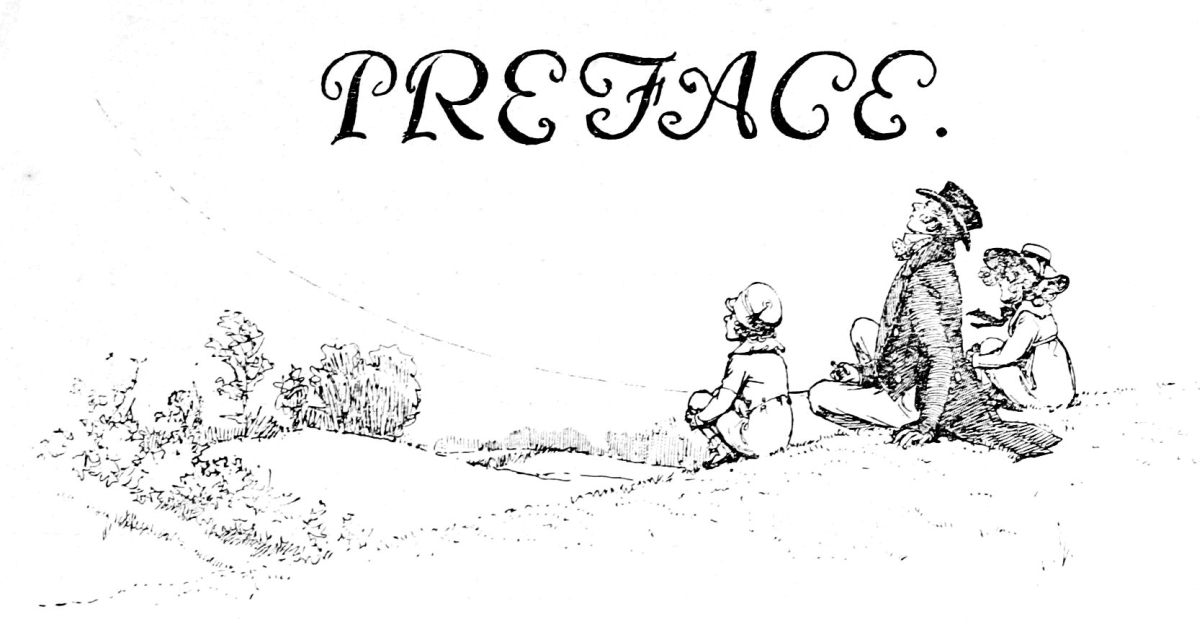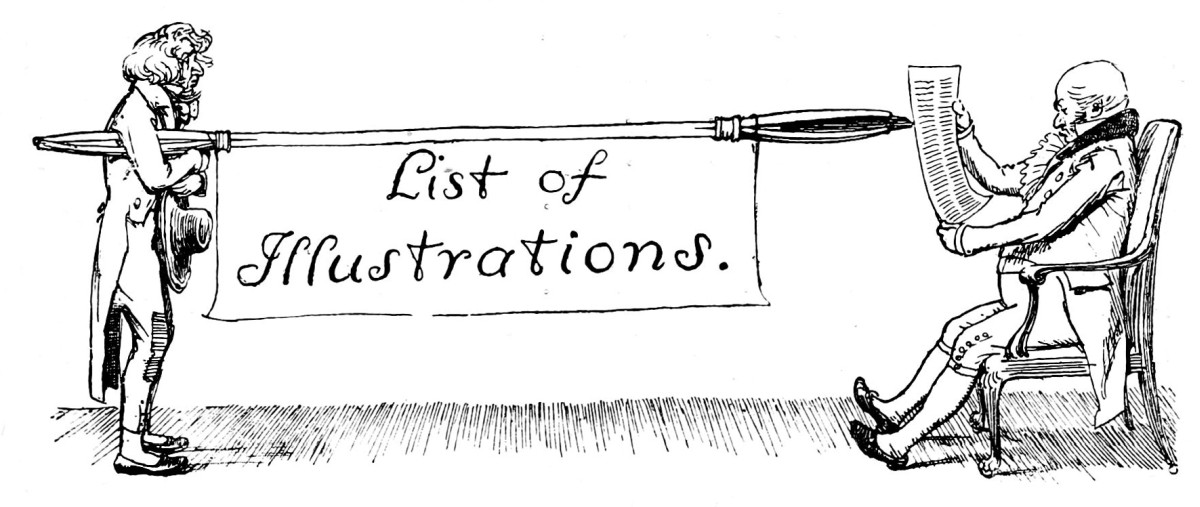Pride and Prejudice
Jane Austen
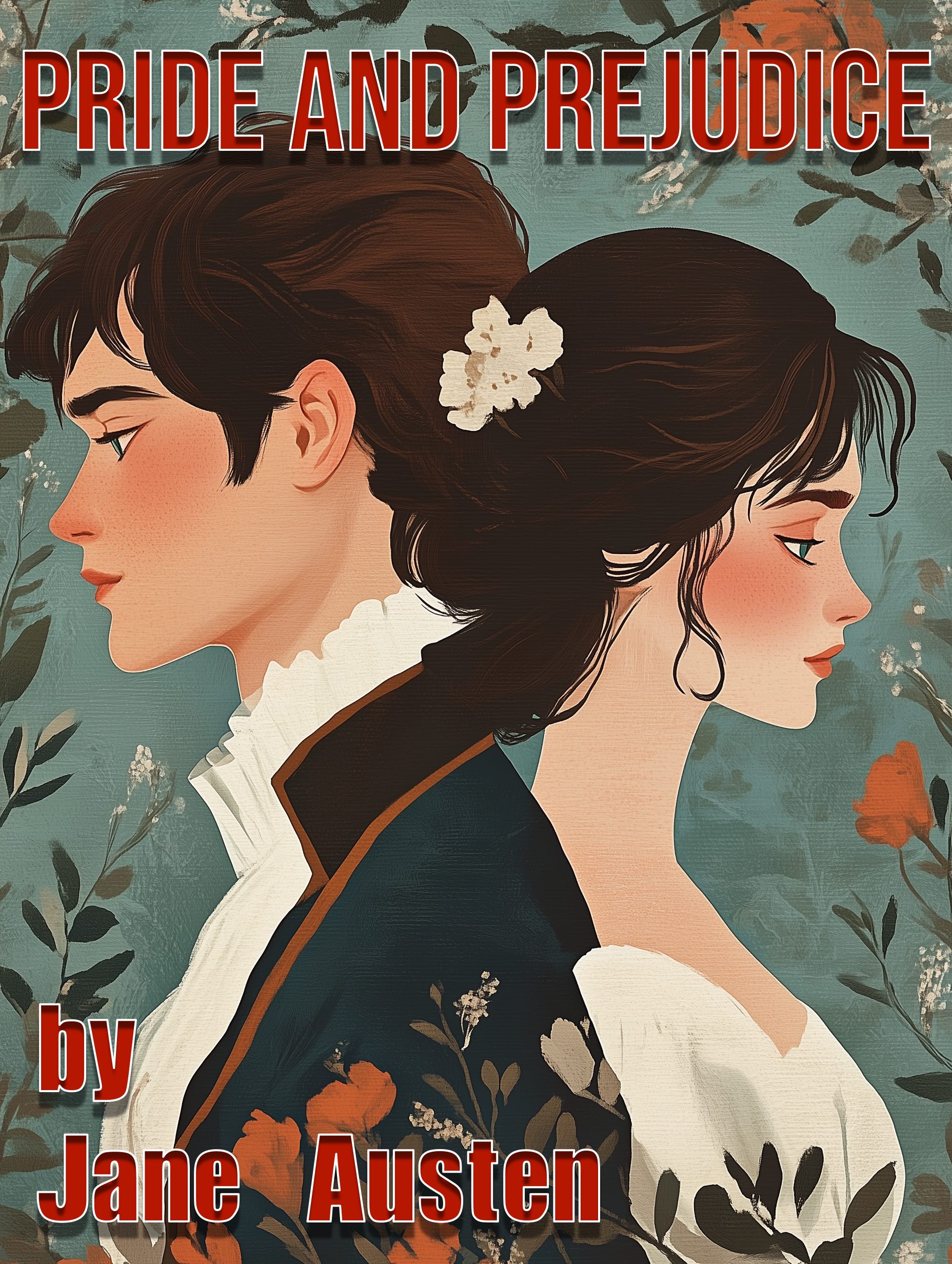
Bookapy License
This ebook is licensed for your personal enjoyment only. This ebook may not be re-sold or given away to other people. If you would like to share this book with another person, please purchase an additional copy for each recipient. If you're reading this book and did not purchase it, or it was not purchased for your use only, then please go to https://bookapy.com/ and acquire your own copy. Thank you for respecting the hard work of this author.
Bookapy License
This ebook is licensed for your personal enjoyment only. This ebook may not be re-sold or given away to other people. If you would like to share this book with another person, please purchase an additional copy for each recipient. If you're reading this book and did not purchase it, or it was not purchased for your use only, then please go to https://bookapy.com/ and acquire your own copy. Thank you for respecting the hard work of this author.
PREFACE.
List of Illustrations.
Chapter: I., II., III., IV., V., VI., VII., VIII., IX., X., XI., XII., XIII., XIV., XV., XVI., XVII., XVIII., XIX., XX., XXI., XXII., XXIII., XXIV., XXV., XXVI., XXVII., XXVIII., XXIX., XXX., XXXI., XXXII., XXXIII., XXXIV., XXXV., XXXVI., XXXVII., XXXVIII., XXXIX., XL., XLI., XLII., XLIII., XLIV., XLV., XLVI., XLVII., XLVIII., XLIX., L., LI., LII., LIII., LIV., LV., LVI., LVII., LVIII., LIX., LX., LXI.
![[Colophon: GEORGE ALLEN PUBLISHER 156 CHARING CROSS ROAD LONDON]](/readImages/002/411/5862877000761024617_colophon.png)
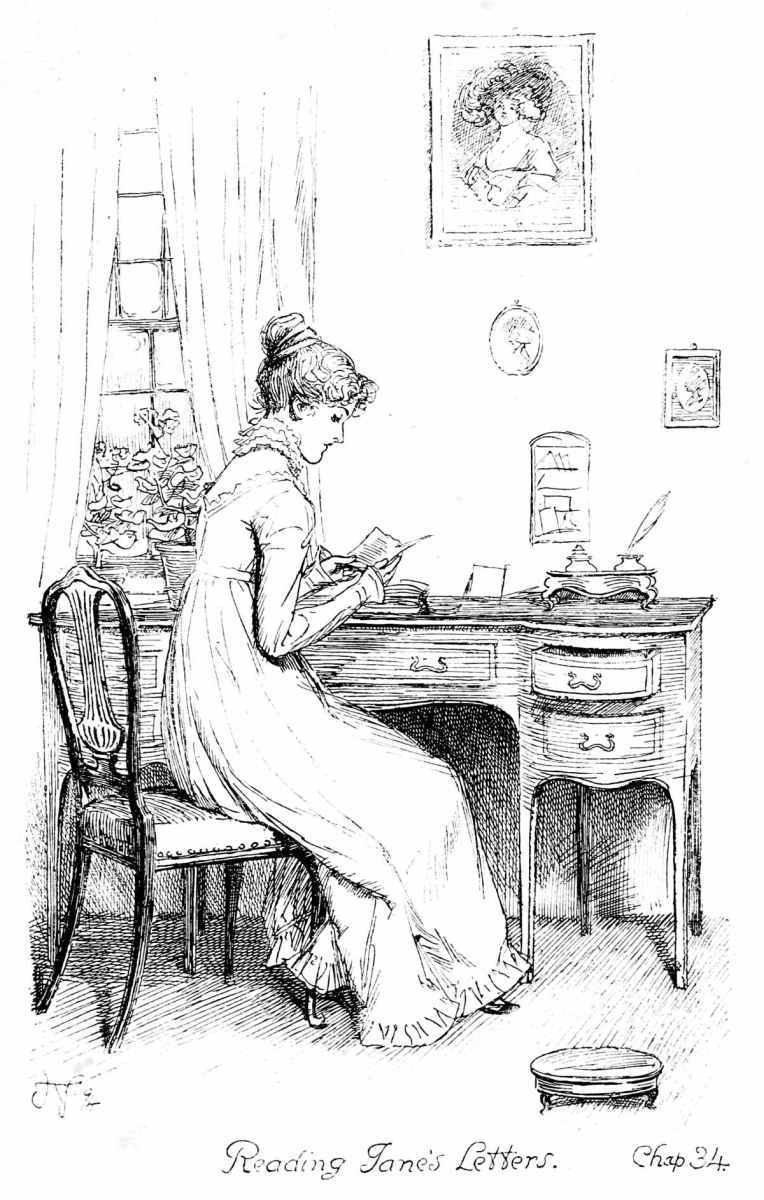
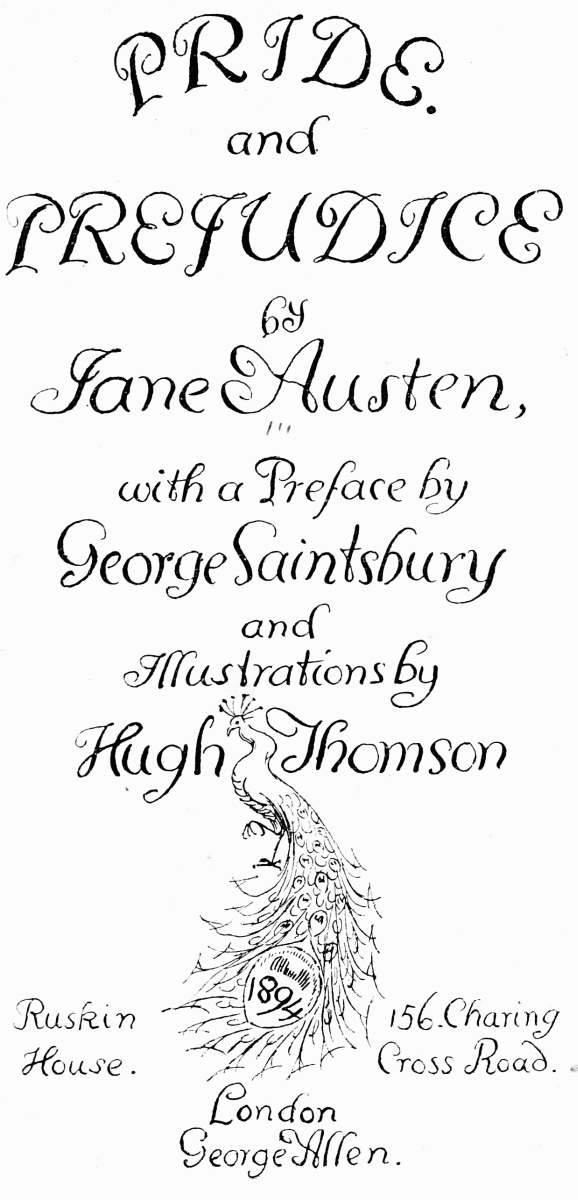
PRIDE.
and
PREJUDICE
by
Jane Austen,
with a Preface by
George Saintsbury
and
Illustrations by
Hugh Thomson
| Ruskin
House. |
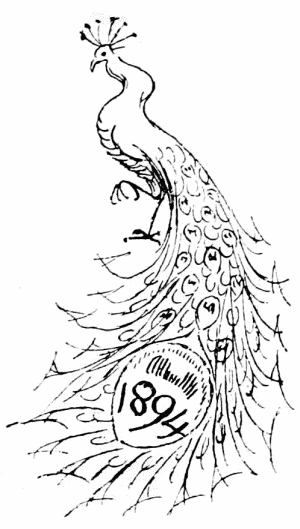
|
156. Charing
Cross Road. |
| London
George Allen. |
||
CHISWICK PRESS:—CHARLES WHITTINGHAM AND CO.
TOOKS COURT, CHANCERY LANE, LONDON.
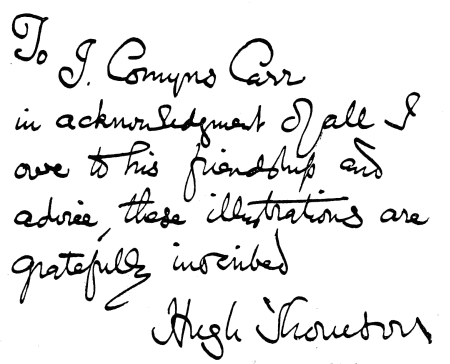
Walt Whitman has somewhere a fine and just distinction between “loving by allowance” and “loving with personal love.” This distinction applies to books as well as to men and women; and in the case of the not very numerous authors who are the objects of the personal affection, it brings a curious consequence with it. There is much more difference as to their best work than in the case of those others who are loved “by allowance” by convention, and because it is felt to be the right and proper thing to love them. And in the sect—fairly large and yet unusually choice—of Austenians or Janites, there would probably be found partisans of the claim to primacy of almost every one of the novels. To some the delightful freshness and humour of Northanger Abbey, its completeness, finish, and entrain, obscure the undoubted critical facts that its scale is small, and its scheme, after all, that of burlesque or parody, a kind in which the first rank is reached with difficulty. Persuasion, relatively faint in tone, and not enthralling in interest, has devotees who exalt above all the others its exquisite delicacy and keeping. The catastrophe of Mansfield Park is admittedly theatrical, the hero and heroine are insipid, and the author has almost wickedly destroyed all romantic interest by expressly admitting that Edmund only took Fanny because Mary shocked him, and that Fanny might very likely have taken Crawford if he had been a little more assiduous; yet the matchless rehearsal-scenes and the characters of Mrs. Norris and others have secured, I believe, a considerable party for it. Sense and Sensibility has perhaps the fewest out-and-out admirers; but it does not want them.
I suppose, however, that the majority of at least competent votes would, all things considered, be divided between Emma and the present book; and perhaps the vulgar verdict (if indeed a fondness for Miss Austen be not of itself a patent of exemption from any possible charge of vulgarity) would go for Emma. It is the larger, the more varied, the more popular; the author had by the time of its composition seen rather more of the world, and had improved her general, though not her most peculiar and characteristic dialogue; such figures as Miss Bates, as the Eltons, cannot but unite the suffrages of everybody. On the other hand, I, for my part, declare for Pride and Prejudice unhesitatingly. It seems to me the most perfect, the most characteristic, the most eminently quintessential of its author’s works; and for this contention in such narrow space as is permitted to me, I propose here to show cause.
In the first place, the book (it may be barely necessary to remind the reader) was in its first shape written very early, somewhere about 1796, when Miss Austen was barely twenty-one; though it was revised and finished at Chawton some fifteen years later, and was not published till 1813, only four years before her death. I do not know whether, in this combination of the fresh and vigorous projection of youth, and the critical revision of middle life, there may be traced the distinct superiority in point of construction, which, as it seems to me, it possesses over all the others. The plot, though not elaborate, is almost regular enough for Fielding; hardly a character, hardly an incident could be retrenched without loss to the story. The elopement of Lydia and Wickham is not, like that of Crawford and Mrs. Rushworth, a coup de théâtre; it connects itself in the strictest way with the course of the story earlier, and brings about the denouement with complete propriety. All the minor passages—the loves of Jane and Bingley, the advent of Mr. Collins, the visit to Hunsford, the Derbyshire tour—fit in after the same unostentatious, but masterly fashion. There is no attempt at the hide-and-seek, in-and-out business, which in the transactions between Frank Churchill and Jane Fairfax contributes no doubt a good deal to the intrigue of Emma, but contributes it in a fashion which I do not think the best feature of that otherwise admirable book. Although Miss Austen always liked something of the misunderstanding kind, which afforded her opportunities for the display of the peculiar and incomparable talent to be noticed presently, she has been satisfied here with the perfectly natural occasions provided by the false account of Darcy’s conduct given by Wickham, and by the awkwardness (arising with equal naturalness) from the gradual transformation of Elizabeth’s own feelings from positive aversion to actual love. I do not know whether the all-grasping hand of the playwright has ever been laid upon Pride and Prejudice; and I dare say that, if it were, the situations would prove not startling or garish enough for the footlights, the character-scheme too subtle and delicate for pit and gallery. But if the attempt were made, it would certainly not be hampered by any of those loosenesses of construction, which, sometimes disguised by the conveniences of which the novelist can avail himself, appear at once on the stage.
I think, however, though the thought will doubtless seem heretical to more than one school of critics, that construction is not the highest merit, the choicest gift, of the novelist. It sets off his other gifts and graces most advantageously to the critical eye; and the want of it will sometimes mar those graces—appreciably, though not quite consciously—to eyes by no means ultra-critical. But a very badly-built novel which excelled in pathetic or humorous character, or which displayed consummate command of dialogue—perhaps the rarest of all faculties—would be an infinitely better thing than a faultless plot acted and told by puppets with pebbles in their mouths. And despite the ability which Miss Austen has shown in working out the story, I for one should put Pride and Prejudice far lower if it did not contain what seem to me the very masterpieces of Miss Austen’s humour and of her faculty of character-creation—masterpieces who may indeed admit John Thorpe, the Eltons, Mrs. Norris, and one or two others to their company, but who, in one instance certainly, and perhaps in others, are still superior to them.
The characteristics of Miss Austen’s humour are so subtle and delicate that they are, perhaps, at all times easier to apprehend than to express, and at any particular time likely to be differently apprehended by different persons. To me this humour seems to possess a greater affinity, on the whole, to that of Addison than to any other of the numerous species of this great British genus. The differences of scheme, of time, of subject, of literary convention, are, of course, obvious enough; the difference of sex does not, perhaps, count for much, for there was a distinctly feminine element in “Mr. Spectator,” and in Jane Austen’s genius there was, though nothing mannish, much that was masculine. But the likeness of quality consists in a great number of common subdivisions of quality—demureness, extreme minuteness of touch, avoidance of loud tones and glaring effects. Also there is in both a certain not inhuman or unamiable cruelty. It is the custom with those who judge grossly to contrast the good nature of Addison with the savagery of Swift, the mildness of Miss Austen with the boisterousness of Fielding and Smollett, even with the ferocious practical jokes that her immediate predecessor, Miss Burney, allowed without very much protest. Yet, both in Mr. Addison and in Miss Austen there is, though a restrained and well-mannered, an insatiable and ruthless delight in roasting and cutting up a fool. A man in the early eighteenth century, of course, could push this taste further than a lady in the early nineteenth; and no doubt Miss Austen’s principles, as well as her heart, would have shrunk from such things as the letter from the unfortunate husband in the Spectator, who describes, with all the gusto and all the innocence in the world, how his wife and his friend induce him to play at blind-man’s-buff. But another Spectator letter—that of the damsel of fourteen who wishes to marry Mr. Shapely, and assures her selected Mentor that “he admires your Spectators mightily”—might have been written by a rather more ladylike and intelligent Lydia Bennet in the days of Lydia’s great-grandmother; while, on the other hand, some (I think unreasonably) have found “cynicism” in touches of Miss Austen’s own, such as her satire of Mrs. Musgrove’s self-deceiving regrets over her son. But this word “cynical” is one of the most misused in the English language, especially when, by a glaring and gratuitous falsification of its original sense, it is applied, not to rough and snarling invective, but to gentle and oblique satire. If cynicism means the perception of “the other side,” the sense of “the accepted hells beneath,” the consciousness that motives are nearly always mixed, and that to seem is not identical with to be—if this be cynicism, then every man and woman who is not a fool, who does not care to live in a fool’s paradise, who has knowledge of nature and the world and life, is a cynic. And in that sense Miss Austen certainly was one. She may even have been one in the further sense that, like her own Mr. Bennet, she took an epicurean delight in dissecting, in displaying, in setting at work her fools and her mean persons. I think she did take this delight, and I do not think at all the worse of her for it as a woman, while she was immensely the better for it as an artist.
In respect of her art generally, Mr. Goldwin Smith has truly observed that “metaphor has been exhausted in depicting the perfection of it, combined with the narrowness of her field;” and he has justly added that we need not go beyond her own comparison to the art of a miniature painter. To make this latter observation quite exact we must not use the term miniature in its restricted sense, and must think rather of Memling at one end of the history of painting and Meissonier at the other, than of Cosway or any of his kind. And I am not so certain that I should myself use the word “narrow” in connection with her. If her world is a microcosm, the cosmic quality of it is at least as eminent as the littleness. She does not touch what she did not feel herself called to paint; I am not so sure that she could not have painted what she did not feel herself called to touch. It is at least remarkable that in two very short periods of writing—one of about three years, and another of not much more than five—she executed six capital works, and has not left a single failure. It is possible that the romantic paste in her composition was defective: we must always remember that hardly anybody born in her decade—that of the eighteenth-century seventies—independently exhibited the full romantic quality. Even Scott required hill and mountain and ballad, even Coleridge metaphysics and German to enable them to chip the classical shell. Miss Austen was an English girl, brought up in a country retirement, at the time when ladies went back into the house if there was a white frost which might pierce their kid shoes, when a sudden cold was the subject of the gravest fears, when their studies, their ways, their conduct were subject to all those fantastic limits and restrictions against which Mary Wollstonecraft protested with better general sense than particular taste or judgment. Miss Austen, too, drew back when the white frost touched her shoes; but I think she would have made a pretty good journey even in a black one.
For if her knowledge was not very extended, she knew two things which only genius knows. The one was humanity, and the other was art. On the first head she could not make a mistake; her men, though limited, are true, and her women are, in the old sense, “absolute.” As to art, if she has never tried idealism, her realism is real to a degree which makes the false realism of our own day look merely dead-alive. Take almost any Frenchman, except the late M. de Maupassant, and watch him laboriously piling up strokes in the hope of giving a complete impression. You get none; you are lucky if, discarding two-thirds of what he gives, you can shape a real impression out of the rest. But with Miss Austen the myriad, trivial, unforced strokes build up the picture like magic. Nothing is false; nothing is superfluous. When (to take the present book only) Mr. Collins changed his mind from Jane to Elizabeth “while Mrs. Bennet was stirring the fire” (and we know how Mrs. Bennet would have stirred the fire), when Mr. Darcy “brought his coffee-cup back himself,” the touch in each case is like that of Swift—“taller by the breadth of my nail”—which impressed the half-reluctant Thackeray with just and outspoken admiration. Indeed, fantastic as it may seem, I should put Miss Austen as near to Swift in some ways, as I have put her to Addison in others.
This Swiftian quality appears in the present novel as it appears nowhere else in the character of the immortal, the ineffable Mr. Collins. Mr. Collins is really great; far greater than anything Addison ever did, almost great enough for Fielding or for Swift himself. It has been said that no one ever was like him. But in the first place, he was like him; he is there—alive, imperishable, more real than hundreds of prime ministers and archbishops, of “metals, semi-metals, and distinguished philosophers.” In the second place, it is rash, I think, to conclude that an actual Mr. Collins was impossible or non-existent at the end of the eighteenth century. It is very interesting that we possess, in this same gallery, what may be called a spoiled first draught, or an unsuccessful study of him, in John Dashwood. The formality, the under-breeding, the meanness, are there; but the portrait is only half alive, and is felt to be even a little unnatural. Mr. Collins is perfectly natural, and perfectly alive. In fact, for all the “miniature,” there is something gigantic in the way in which a certain side, and more than one, of humanity, and especially eighteenth-century humanity, its Philistinism, its well-meaning but hide-bound morality, its formal pettiness, its grovelling respect for rank, its materialism, its selfishness, receives exhibition. I will not admit that one speech or one action of this inestimable man is incapable of being reconciled with reality, and I should not wonder if many of these words and actions are historically true.
But the greatness of Mr. Collins could not have been so satisfactorily exhibited if his creatress had not adjusted so artfully to him the figures of Mr. Bennet and of Lady Catherine de Bourgh. The latter, like Mr. Collins himself, has been charged with exaggeration. There is, perhaps, a very faint shade of colour for the charge; but it seems to me very faint indeed. Even now I do not think that it would be impossible to find persons, especially female persons, not necessarily of noble birth, as overbearing, as self-centred, as neglectful of good manners, as Lady Catherine. A hundred years ago, an earl’s daughter, the Lady Powerful (if not exactly Bountiful) of an out-of-the-way country parish, rich, long out of marital authority, and so forth, had opportunities of developing these agreeable characteristics which seldom present themselves now. As for Mr. Bennet, Miss Austen, and Mr. Darcy, and even Miss Elizabeth herself, were, I am inclined to think, rather hard on him for the “impropriety” of his conduct. His wife was evidently, and must always have been, a quite irreclaimable fool; and unless he had shot her or himself there was no way out of it for a man of sense and spirit but the ironic. From no other point of view is he open to any reproach, except for an excusable and not unnatural helplessness at the crisis of the elopement, and his utterances are the most acutely delightful in the consciously humorous kind—in the kind that we laugh with, not at—that even Miss Austen has put into the mouth of any of her characters. It is difficult to know whether he is most agreeable when talking to his wife, or when putting Mr. Collins through his paces; but the general sense of the world has probably been right in preferring to the first rank his consolation to the former when she maunders over the entail, “My dear, do not give way to such gloomy thoughts. Let us hope for better things. Let us flatter ourselves that I may be the survivor;” and his inquiry to his colossal cousin as to the compliments which Mr. Collins has just related as made by himself to Lady Catherine, “May I ask whether these pleasing attentions proceed from the impulse of the moment, or are the result of previous study?” These are the things which give Miss Austen’s readers the pleasant shocks, the delightful thrills, which are felt by the readers of Swift, of Fielding, and we may here add, of Thackeray, as they are felt by the readers of no other English author of fiction outside of these four.
The goodness of the minor characters in Pride and Prejudice has been already alluded to, and it makes a detailed dwelling on their beauties difficult in any space, and impossible in this. Mrs. Bennet we have glanced at, and it is not easy to say whether she is more exquisitely amusing or more horribly true. Much the same may be said of Kitty and Lydia; but it is not every author, even of genius, who would have differentiated with such unerring skill the effects of folly and vulgarity of intellect and disposition working upon the common weaknesses of woman at such different ages. With Mary, Miss Austen has taken rather less pains, though she has been even more unkind to her; not merely in the text, but, as we learn from those interesting traditional appendices which Mr. Austen Leigh has given us, in dooming her privately to marry “one of Mr. Philips’s clerks.” The habits of first copying and then retailing moral sentiments, of playing and singing too long in public, are, no doubt, grievous and criminal; but perhaps poor Mary was rather the scapegoat of the sins of blue stockings in that Fordyce-belectured generation. It is at any rate difficult not to extend to her a share of the respect and affection (affection and respect of a peculiar kind; doubtless), with which one regards Mr. Collins, when she draws the moral of Lydia’s fall. I sometimes wish that the exigencies of the story had permitted Miss Austen to unite these personages, and thus at once achieve a notable mating and soothe poor Mrs. Bennet’s anguish over the entail.
The Bingleys and the Gardiners and the Lucases, Miss Darcy and Miss de Bourgh, Jane, Wickham, and the rest, must pass without special comment, further than the remark that Charlotte Lucas (her egregious papa, though delightful, is just a little on the thither side of the line between comedy and farce) is a wonderfully clever study in drab of one kind, and that Wickham (though something of Miss Austen’s hesitation of touch in dealing with young men appears) is a not much less notable sketch in drab of another. Only genius could have made Charlotte what she is, yet not disagreeable; Wickham what he is, without investing him either with a cheap Don Juanish attractiveness or a disgusting rascality. But the hero and the heroine are not tints to be dismissed.
Darcy has always seemed to me by far the best and most interesting of Miss Austen’s heroes; the only possible competitor being Henry Tilney, whose part is so slight and simple that it hardly enters into comparison. It has sometimes, I believe, been urged that his pride is unnatural at first in its expression and later in its yielding, while his falling in love at all is not extremely probable. Here again I cannot go with the objectors. Darcy’s own account of the way in which his pride had been pampered, is perfectly rational and sufficient; and nothing could be, psychologically speaking, a causa verior for its sudden restoration to healthy conditions than the shock of Elizabeth’s scornful refusal acting on a nature ex hypothesi generous. Nothing in even our author is finer and more delicately touched than the change of his demeanour at the sudden meeting in the grounds of Pemberley. Had he been a bad prig or a bad coxcomb, he might have been still smarting under his rejection, or suspicious that the girl had come husband-hunting. His being neither is exactly consistent with the probable feelings of a man spoilt in the common sense, but not really injured in disposition, and thoroughly in love. As for his being in love, Elizabeth has given as just an exposition of the causes of that phenomenon as Darcy has of the conditions of his unregenerate state, only she has of course not counted in what was due to her own personal charm.
The secret of that charm many men and not a few women, from Miss Austen herself downwards, have felt, and like most charms it is a thing rather to be felt than to be explained. Elizabeth of course belongs to the allegro or allegra division of the army of Venus. Miss Austen was always provokingly chary of description in regard to her beauties; and except the fine eyes, and a hint or two that she had at any rate sometimes a bright complexion, and was not very tall, we hear nothing about her looks. But her chief difference from other heroines of the lively type seems to lie first in her being distinctly clever—almost strong-minded, in the better sense of that objectionable word—and secondly in her being entirely destitute of ill-nature for all her propensity to tease and the sharpness of her tongue. Elizabeth can give at least as good as she gets when she is attacked; but she never “scratches,” and she never attacks first. Some of the merest obsoletenesses of phrase and manner give one or two of her early speeches a slight pertness, but that is nothing, and when she comes to serious business, as in the great proposal scene with Darcy (which is, as it should be, the climax of the interest of the book), and in the final ladies’ battle with Lady Catherine, she is unexceptionable. Then too she is a perfectly natural girl. She does not disguise from herself or anybody that she resents Darcy’s first ill-mannered personality with as personal a feeling. (By the way, the reproach that the ill-manners of this speech are overdone is certainly unjust; for things of the same kind, expressed no doubt less stiltedly but more coarsely, might have been heard in more than one ball-room during this very year from persons who ought to have been no worse bred than Darcy.) And she lets the injury done to Jane and the contempt shown to the rest of her family aggravate this resentment in the healthiest way in the world.
Still, all this does not explain her charm, which, taking beauty as a common form of all heroines, may perhaps consist in the addition to her playfulness, her wit, her affectionate and natural disposition, of a certain fearlessness very uncommon in heroines of her type and age. Nearly all of them would have been in speechless awe of the magnificent Darcy; nearly all of them would have palpitated and fluttered at the idea of proposals, even naughty ones, from the fascinating Wickham. Elizabeth, with nothing offensive, nothing viraginous, nothing of the “New Woman” about her, has by nature what the best modern (not “new”) women have by education and experience, a perfect freedom from the idea that all men may bully her if they choose, and that most will away with her if they can. Though not in the least “impudent and mannish grown,” she has no mere sensibility, no nasty niceness about her. The form of passion common and likely to seem natural in Miss Austen’s day was so invariably connected with the display of one or the other, or both of these qualities, that she has not made Elizabeth outwardly passionate. But I, at least, have not the slightest doubt that she would have married Darcy just as willingly without Pemberley as with it, and anybody who can read between lines will not find the lovers’ conversations in the final chapters so frigid as they might have looked to the Della Cruscans of their own day, and perhaps do look to the Della Cruscans of this.
And, after all, what is the good of seeking for the reason of charm?—it is there. There were better sense in the sad mechanic exercise of determining the reason of its absence where it is not. In the novels of the last hundred years there are vast numbers of young ladies with whom it might be a pleasure to fall in love; there are at least five with whom, as it seems to me, no man of taste and spirit can help doing so. Their names are, in chronological order, Elizabeth Bennet, Diana Vernon, Argemone Lavington, Beatrix Esmond, and Barbara Grant. I should have been most in love with Beatrix and Argemone; I should, I think, for mere occasional companionship, have preferred Diana and Barbara. But to live with and to marry, I do not know that any one of the four can come into competition with Elizabeth.
George Saintsbury.
| PAGE | |
| Frontispiece | iv |
| Title-page | v |
| Dedication | vii |
| Heading to Preface | ix |
| Heading to List of Illustrations | xxv |
| Heading to Chapter I. | 1 |
| “He came down to see the place” | 2 |
| Mr. and Mrs. Bennet | 5 |
| “I hope Mr. Bingley will like it” | 6 |
| “I’m the tallest” | 9 |
| “He rode a black horse” | 10 |
| “When the party entered” | 12 |
| “She is tolerable” | 15 |
| Heading to Chapter IV. | 18 |
| Heading to Chapter V. | 22 |
| “Without once opening his lips” | 24 |
| Tailpiece to Chapter V. | 26 |
| Heading to Chapter VI. | 27 |
| “The entreaties of several” | 31 |
| “A note for Miss Bennet” | 36 |
| “Cheerful prognostics” | 40 |
| “The apothecary came” | 43 |
| “Covering a screen” | 45 |
| “Mrs. Bennet and her two youngest girls” | 53 |
| Heading to Chapter X. | 60 |
| “No, no; stay where you are” | 67 |
| “Piling up the fire” | 69 |
| Heading to Chapter XII. | 75 |
| Heading to Chapter XIII. | 78 |
| Heading to Chapter XIV. | 84 |
| “Protested that he never read novels” | 87 |
| Heading to Chapter XV. | 89 |
| Heading to Chapter XVI. | 95 |
| “The officers of the ——shire” | 97 |
| “Delighted to see their dear friend again” | 108 |
| Heading to Chapter XVIII. | 113 |
| “Such very superior dancing is not often seen” | 118 |
| “To assure you in the most animated language” | 132 |
| Heading to Chapter XX. | 139 |
| “They entered the breakfast-room” | 143 |
| Heading to Chapter XXI. | 146 |
| “Walked back with them” | 148 |
| Heading to Chapter XXII. | 154 |
| “So much love and eloquence” | 156 |
| “Protested he must be entirely mistaken” | 161 |
| “Whenever she spoke in a low voice” | 166 |
| Heading to Chapter XXIV. | 168 |
| Heading to Chapter XXV. | 175 |
| “Offended two or three young ladies” | 177 |
| “Will you come and see me?” | 181 |
| “On the stairs” | 189 |
| “At the door” | 194 |
| “In conversation with the ladies” | 198 |
| “Lady Catherine,” said she, “you have given me a treasure” | 200 |
| Heading to Chapter XXX. | 209 |
| “He never failed to inform them” | 211 |
| “The gentlemen accompanied him” | 213 |
| Heading to Chapter XXXI. | 215 |
| Heading to Chapter XXXII. | 221 |
| “Accompanied by their aunt” | 225 |
| “On looking up” | 228 |
| Heading to Chapter XXXIV. | 235 |
| “Hearing herself called” | 243 |
| Heading to Chapter XXXVI. | 253 |
| “Meeting accidentally in town” | 256 |
| “His parting obeisance” | 261 |
| “Dawson” | 263 |
| “The elevation of his feelings” | 267 |
| “They had forgotten to leave any message” | 270 |
| “How nicely we are crammed in!” | 272 |
| Heading to Chapter XL. | 278 |
| “I am determined never to speak of it again” | 283 |
| “When Colonel Miller’s regiment went away” | 285 |
| “Tenderly flirting” | 290 |
| The arrival of the Gardiners | 294 |
| “Conjecturing as to the date” | 301 |
| Heading to Chapter XLIV. | 318 |
| “To make herself agreeable to all” | 321 |
| “Engaged by the river” | 327 |
| Heading to Chapter XLVI. | 334 |
| “I have not an instant to lose” | 339 |
| “The first pleasing earnest of their welcome” | 345 |
| The Post | 359 |
| “To whom I have related the affair” | 363 |
| Heading to Chapter XLIX. | 368 |
| “But perhaps you would like to read it” | 370 |
| “The spiteful old ladies” | 377 |
| “With an affectionate smile” | 385 |
| “I am sure she did not listen” | 393 |
| “Mr. Darcy with him” | 404 |
| “Jane happened to look round” | 415 |
| “Mrs. Long and her nieces” | 420 |
| “Lizzy, my dear, I want to speak to you” | 422 |
| Heading to Chapter LVI. | 431 |
| “After a short survey” | 434 |
| “But now it comes out” | 442 |
| “The efforts of his aunt” | 448 |
| “Unable to utter a syllable” | 457 |
| “The obsequious civility” | 466 |
| Heading to Chapter LXI. | 472 |
| The End | 476 |
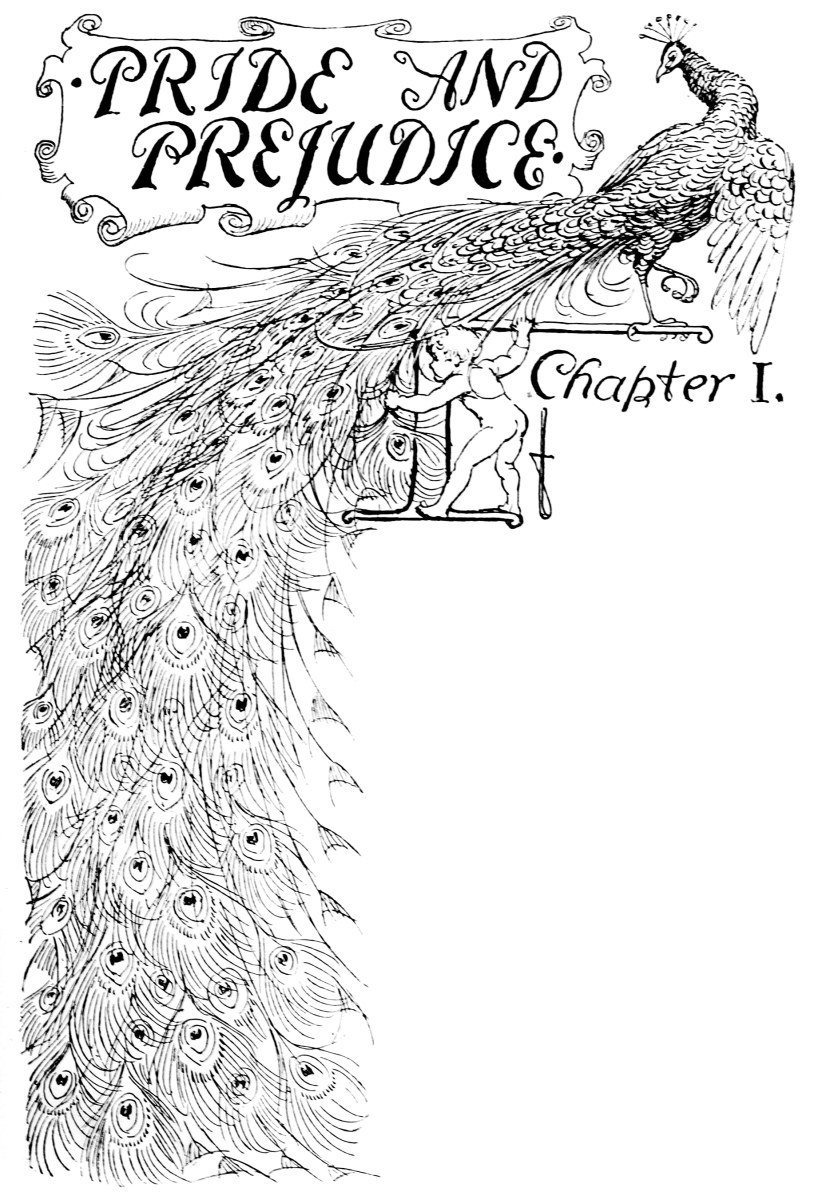
Chapter I.
IT is a truth universally acknowledged, that a single man in possession of a good fortune must be in want of a wife.
However little known the feelings or views of such a man may be on his first entering a neighbourhood, this truth is so well fixed in the minds of the surrounding families, that he is considered as the rightful property of some one or other of their daughters.
“My dear Mr. Bennet,” said his lady to him one day, “have you heard that Netherfield Park is let at last?”
Mr. Bennet replied that he had not.
“But it is,” returned she; “for Mrs. Long has just been here, and she told me all about it.”
Mr. Bennet made no answer.
“Do not you want to know who has taken it?” cried his wife, impatiently.
“You want to tell me, and I have no objection to hearing it.”
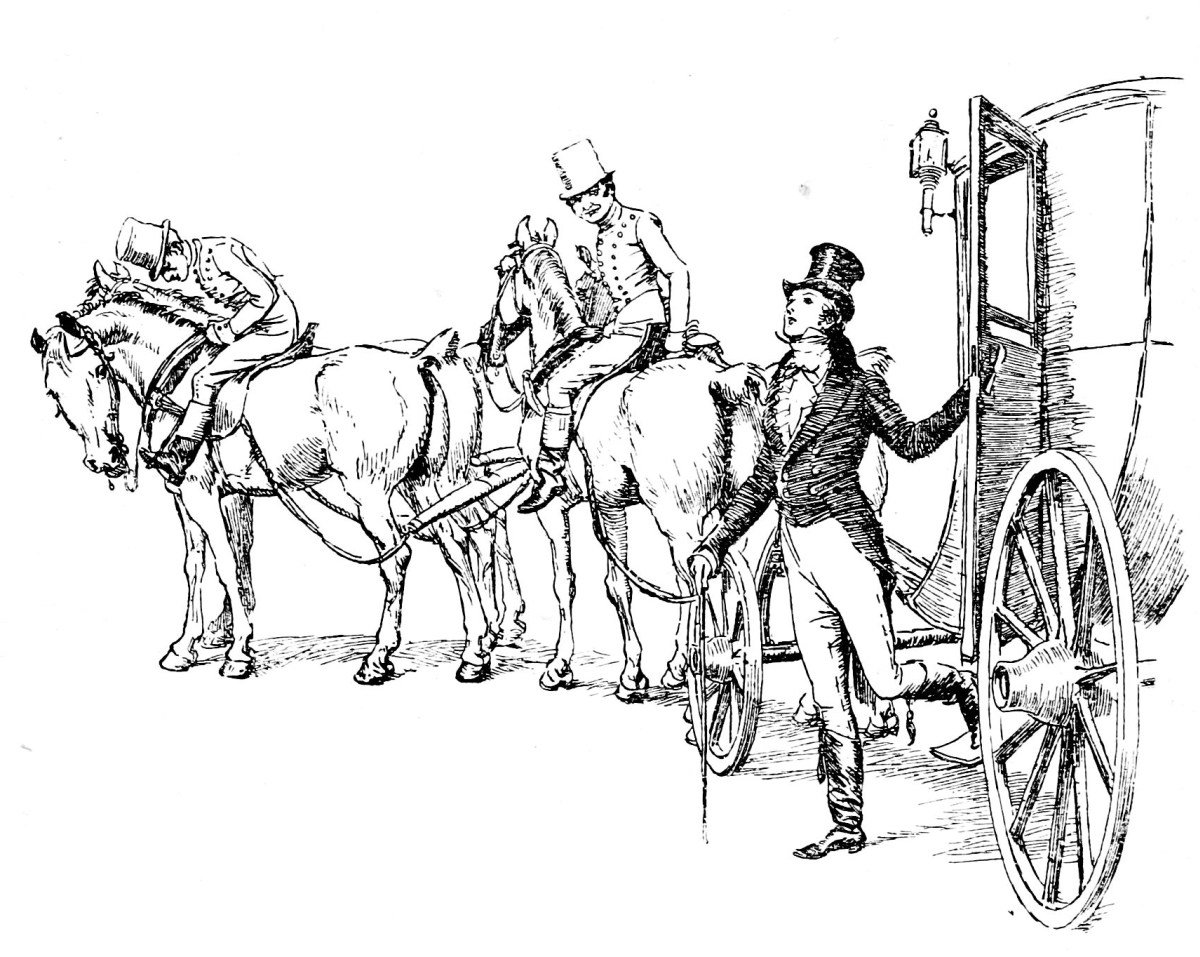
“He came down to see the place”
[Copyright 1894 by George Allen.]
This was invitation enough.
“Why, my dear, you must know, Mrs. Long says that Netherfield is taken by a young man of large fortune from the north of England; that he came down on Monday in a chaise and four to see the place, and was so much delighted with it that he agreed with Mr. Morris immediately; that he is to take possession before Michaelmas, and some of his servants are to be in the house by the end of next week.”
“What is his name?”
“Bingley.”
“Is he married or single?”
“Oh, single, my dear, to be sure! A single man of large fortune; four or five thousand a year. What a fine thing for our girls!”
“How so? how can it affect them?”
“My dear Mr. Bennet,” replied his wife, “how can you be so tiresome? You must know that I am thinking of his marrying one of them.”
“Is that his design in settling here?”
“Design? Nonsense, how can you talk so! But it is very likely that he may fall in love with one of them, and therefore you must visit him as soon as he comes.”
“I see no occasion for that. You and the girls may go—or you may send them by themselves, which perhaps will be still better; for as you are as handsome as any of them, Mr. Bingley might like you the best of the party.”
“My dear, you flatter me. I certainly have had my share of beauty, but I do not pretend to be anything extraordinary now. When a woman has five grown-up daughters, she ought to give over thinking of her own beauty.”
“In such cases, a woman has not often much beauty to think of.”
“But, my dear, you must indeed go and see Mr. Bingley when he comes into the neighbourhood.”
“It is more than I engage for, I assure you.”
“But consider your daughters. Only think what an establishment it would be for one of them. Sir William and Lady Lucas are determined to go, merely on that account; for in general, you know, they visit no new comers. Indeed you must go, for it will be impossible for us to visit him, if you do not.”
“You are over scrupulous, surely. I dare say Mr. Bingley will be very glad to see you; and I will send a few lines by you to assure him of my hearty consent to his marrying whichever he chooses of the girls—though I must throw in a good word for my little Lizzy.”
“I desire you will do no such thing. Lizzy is not a bit better than the others: and I am sure she is not half so handsome as Jane, nor half so good-humoured as Lydia. But you are always giving her the preference.”
“They have none of them much to recommend them,” replied he: “they are all silly and ignorant like other girls; but Lizzy has something more of quickness than her sisters.”
“Mr. Bennet, how can you abuse your own children in such a way? You take delight in vexing me. You have no compassion on my poor nerves.”
“You mistake me, my dear. I have a high respect for your nerves. They are my old friends. I have heard you mention them with consideration these twenty years at least.”
“Ah, you do not know what I suffer.”
“But I hope you will get over it, and live to see many young men of four thousand a year come into the neighbourhood.”
“It will be no use to us, if twenty such should come, since you will not visit them.”
“Depend upon it, my dear, that when there are twenty, I will visit them all.”
Mr. Bennet was so odd a mixture of quick parts, sarcastic humour, reserve, and caprice, that the experience of three-and-twenty years had been insufficient to make his wife understand his character. Her mind was less difficult to develope. She was a woman of mean understanding, little information, and uncertain temper. When she was discontented, she fancied herself nervous. The business of her life was to get her daughters married: its solace was visiting and news.
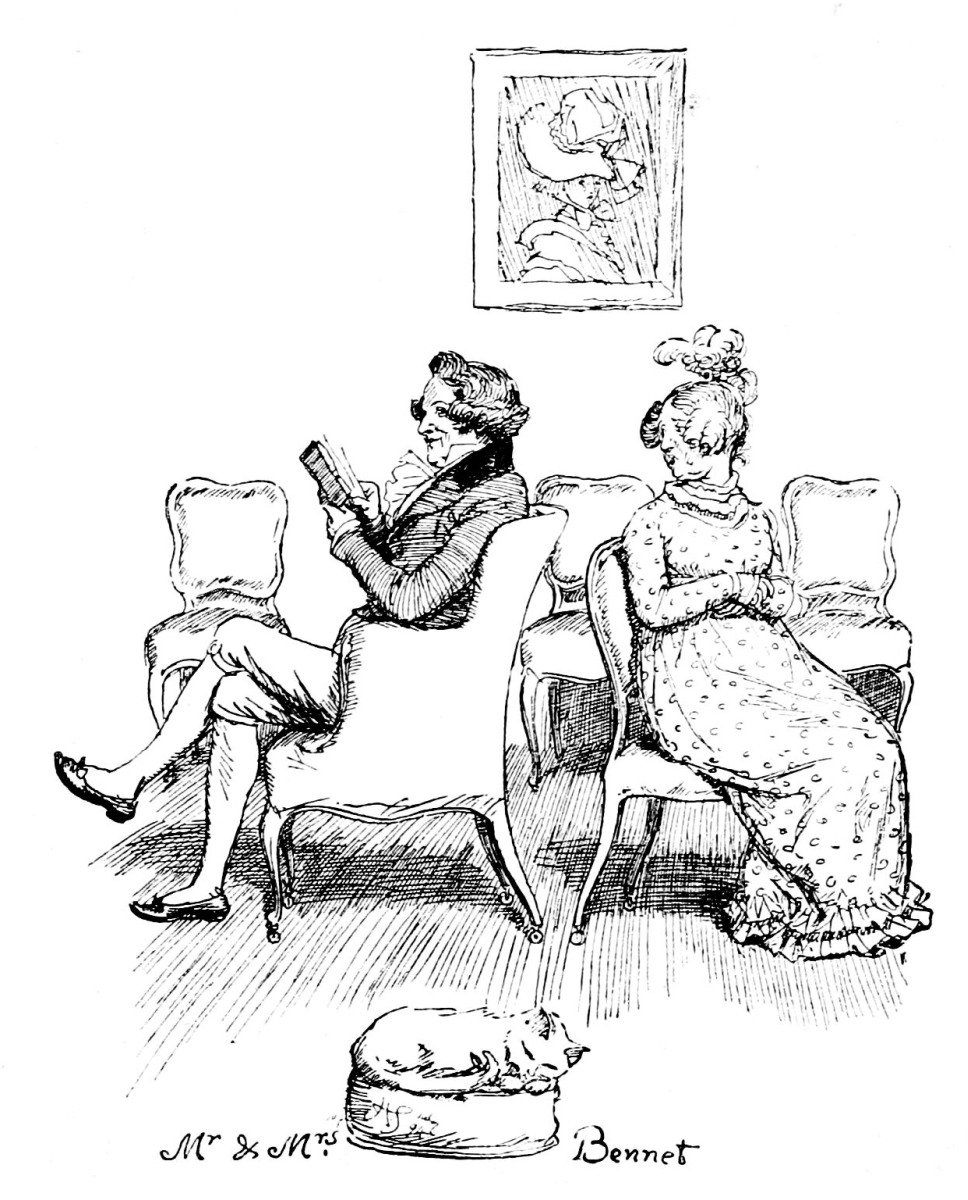
Mr. & Mrs. Bennet
[Copyright 1894 by George Allen.]
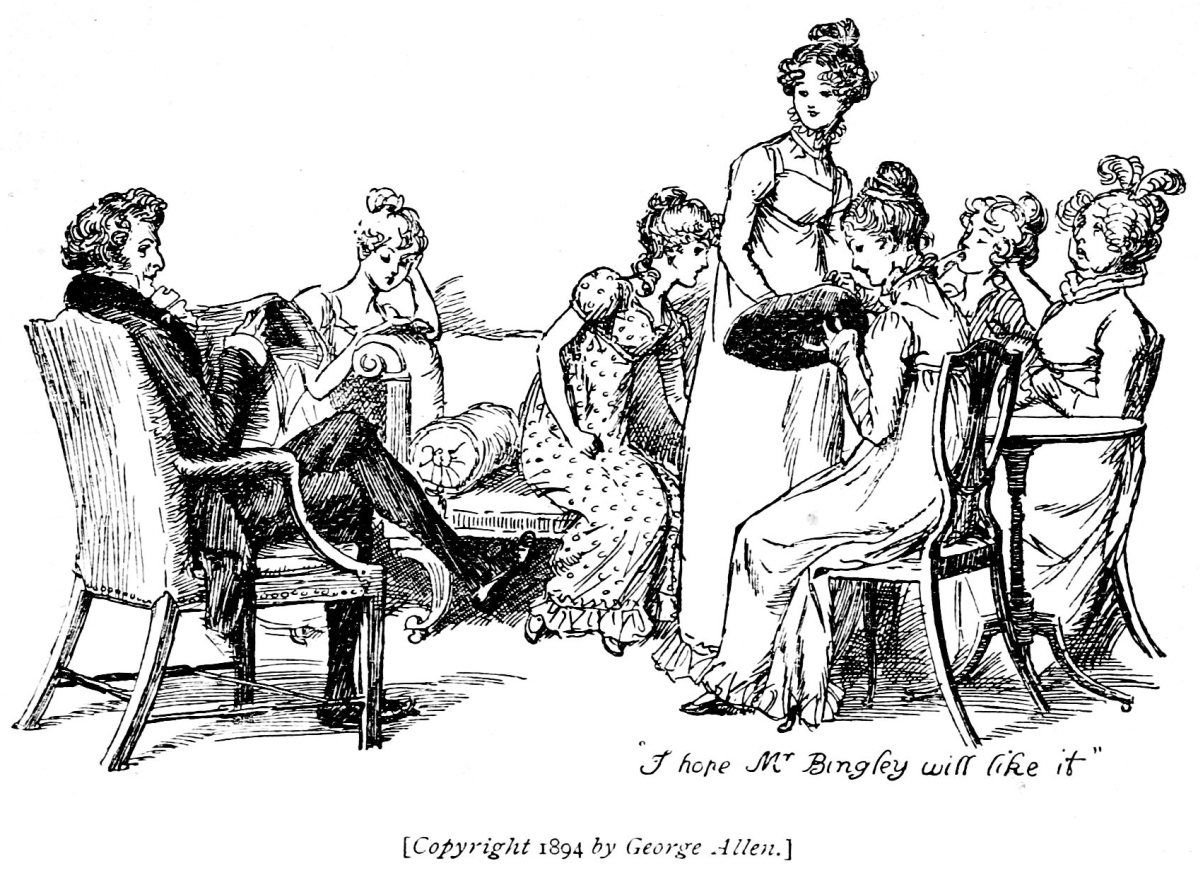 I hope Mr. Bingley will like it.
I hope Mr. Bingley will like it.
CHAPTER II.
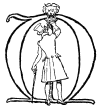 R. BENNET was among the earliest of those who waited on Mr. Bingley. He had always intended to visit him, though to the last always assuring his wife that he should not go; and till the evening after the visit was paid she had no knowledge of it. It was then disclosed in the following manner. Observing his second daughter employed in trimming a hat, he suddenly addressed her with,—
R. BENNET was among the earliest of those who waited on Mr. Bingley. He had always intended to visit him, though to the last always assuring his wife that he should not go; and till the evening after the visit was paid she had no knowledge of it. It was then disclosed in the following manner. Observing his second daughter employed in trimming a hat, he suddenly addressed her with,—
“I hope Mr. Bingley will like it, Lizzy.”
“We are not in a way to know what Mr. Bingley likes,” said her mother, resentfully, “since we are not to visit.”
“But you forget, mamma,” said Elizabeth, “that we shall meet him at the assemblies, and that Mrs. Long has promised to introduce him.”
“I do not believe Mrs. Long will do any such thing. She has two nieces of her own. She is a selfish, hypocritical woman, and I have no opinion of her.”
“No more have I,” said Mr. Bennet; “and I am glad to find that you do not depend on her serving you.”
Mrs. Bennet deigned not to make any reply; but, unable to contain herself, began scolding one of her daughters.
“Don’t keep coughing so, Kitty, for heaven’s sake! Have a little compassion on my nerves. You tear them to pieces.”
“Kitty has no discretion in her coughs,” said her father; “she times them ill.”
“I do not cough for my own amusement,” replied Kitty, fretfully. “When is your next ball to be, Lizzy?”
“To-morrow fortnight.”
“Ay, so it is,” cried her mother, “and Mrs. Long does not come back till the day before; so, it will be impossible for her to introduce him, for she will not know him herself.”
“Then, my dear, you may have the advantage of your friend, and introduce Mr. Bingley to her.”
“Impossible, Mr. Bennet, impossible, when I am not acquainted with him myself; how can you be so teasing?”
“I honour your circumspection. A fortnight’s acquaintance is certainly very little. One cannot know what a man really is by the end of a fortnight. But if we do not venture, somebody else will; and after all, Mrs. Long and her nieces must stand their chance; and, therefore, as she will think it an act of kindness, if you decline the office, I will take it on myself.”
The girls stared at their father. Mrs. Bennet said only, “Nonsense, nonsense!”
“What can be the meaning of that emphatic exclamation?” cried he. “Do you consider the forms of introduction, and the stress that is laid on them, as nonsense? I cannot quite agree with you there. What say you, Mary? For you are a young lady of deep reflection, I know, and read great books, and make extracts.”
Mary wished to say something very sensible, but knew not how.
“While Mary is adjusting her ideas,” he continued, “let us return to Mr. Bingley.”
“I am sick of Mr. Bingley,” cried his wife.
“I am sorry to hear that; but why did you not tell me so before? If I had known as much this morning, I certainly would not have called on him. It is very unlucky; but as I have actually paid the visit, we cannot escape the acquaintance now.”
The astonishment of the ladies was just what he wished—that of Mrs. Bennet perhaps surpassing the rest; though when the first tumult of joy was over, she began to declare that it was what she had expected all the while.
“How good it was in you, my dear Mr. Bennet! But I knew I should persuade you at last. I was sure you loved your girls too well to neglect such an acquaintance. Well, how pleased I am! And it is such a good joke, too, that you should have gone this morning, and never said a word about it till now.”
“Now, Kitty, you may cough as much as you choose,” said Mr. Bennet; and, as he spoke, he left the room, fatigued with the raptures of his wife.
“What an excellent father you have, girls,” said she, when the door was shut. “I do not know how you will ever make him amends for his kindness; or me either, for that matter. At our time of life, it is not so pleasant, I can tell you, to be making new acquaintances every day; but for your sakes we would do anything. Lydia, my love, though you are the youngest, I dare say Mr. Bingley will dance with you at the next ball.”
“Oh,” said Lydia, stoutly, “I am not afraid; for though I am the youngest, I’m the tallest.”
The rest of the evening was spent in conjecturing how soon he would return Mr. Bennet’s visit, and determining when they should ask him to dinner.
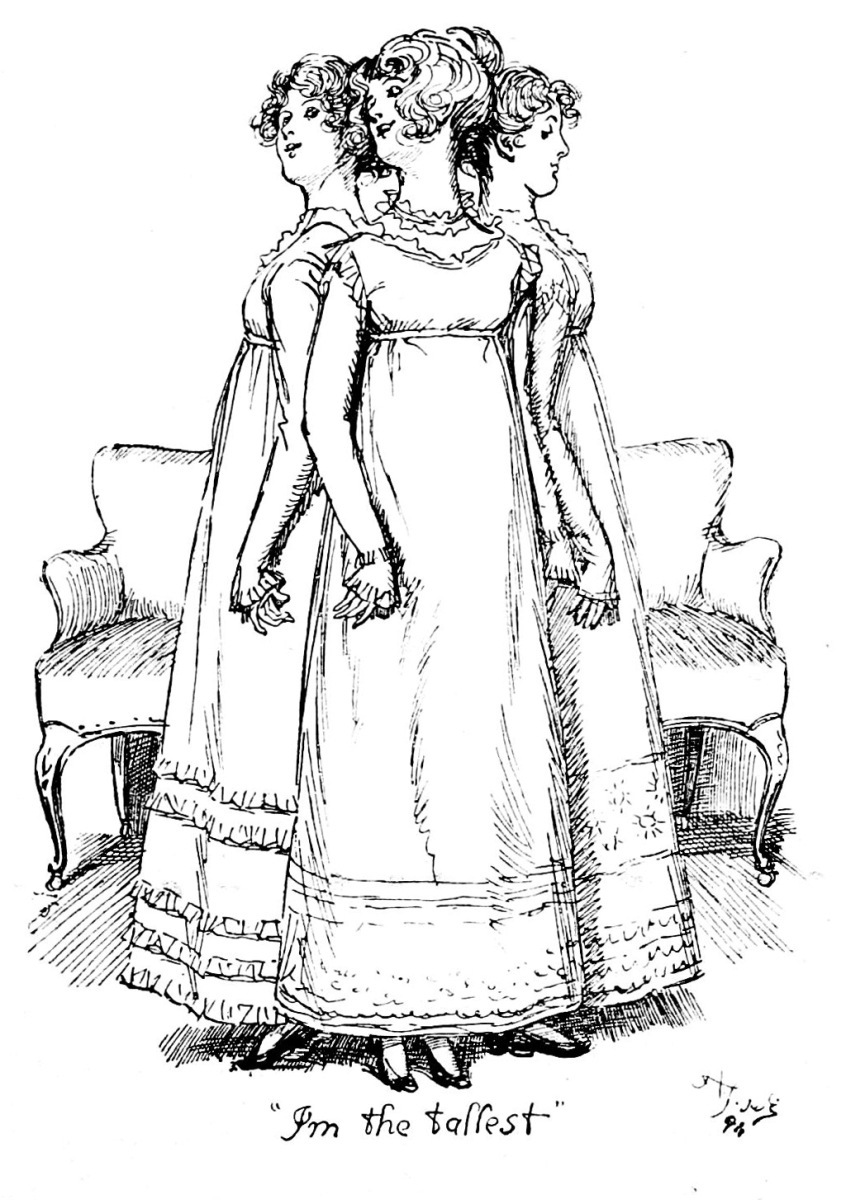
“I’m the tallest”
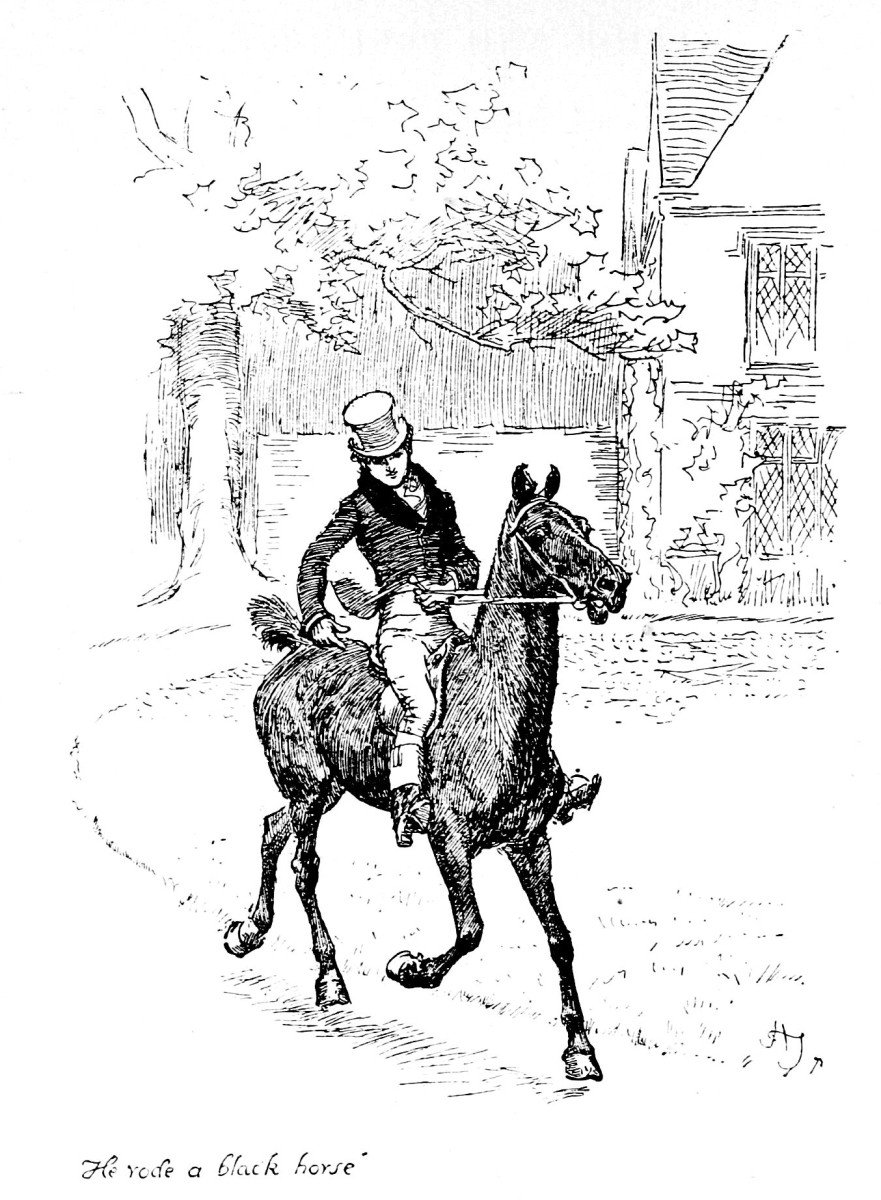
He rode a black horse.
CHAPTER III.
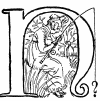 OT all that Mrs. Bennet, however, with the assistance of her five daughters, could ask on the subject, was sufficient to draw from her husband any satisfactory description of Mr. Bingley. They attacked him in various ways, with barefaced questions, ingenious suppositions, and distant surmises; but he eluded the skill of them all; and they were at last obliged to accept the second-hand intelligence of their neighbour, Lady Lucas. Her report was highly favourable. Sir William had been delighted with him. He was quite young, wonderfully handsome, extremely agreeable, and, to crown the whole, he meant to be at the next assembly with a large party. Nothing could be more delightful! To be fond of dancing was a certain step towards falling in love; and very lively hopes of Mr. Bingley’s heart were entertained.
OT all that Mrs. Bennet, however, with the assistance of her five daughters, could ask on the subject, was sufficient to draw from her husband any satisfactory description of Mr. Bingley. They attacked him in various ways, with barefaced questions, ingenious suppositions, and distant surmises; but he eluded the skill of them all; and they were at last obliged to accept the second-hand intelligence of their neighbour, Lady Lucas. Her report was highly favourable. Sir William had been delighted with him. He was quite young, wonderfully handsome, extremely agreeable, and, to crown the whole, he meant to be at the next assembly with a large party. Nothing could be more delightful! To be fond of dancing was a certain step towards falling in love; and very lively hopes of Mr. Bingley’s heart were entertained.
“If I can but see one of my daughters happily settled at Netherfield,” said Mrs. Bennet to her husband, “and all the others equally well married, I shall have nothing to wish for.”
In a few days Mr. Bingley returned Mr. Bennet’s visit, and sat about ten minutes with him in his library. He had entertained hopes of being admitted to a sight of the young ladies, of whose beauty he had heard much; but he saw only the father. The ladies were somewhat more fortunate, for they had the advantage of ascertaining, from an upper window, that he wore a blue coat and rode a black horse.
An invitation to dinner was soon afterwards despatched; and already had Mrs. Bennet planned the courses that were to do credit to her housekeeping, when an answer arrived which deferred it all. Mr. Bingley was obliged to be in town the following day, and consequently unable to accept the honour of their invitation, etc. Mrs. Bennet was quite disconcerted. She could not imagine what business he could have in town so soon after his arrival in Hertfordshire; and she began to fear that he might always be flying about from one place to another, and never settled at Netherfield as he ought to be. Lady Lucas quieted her fears a little by starting the idea of his
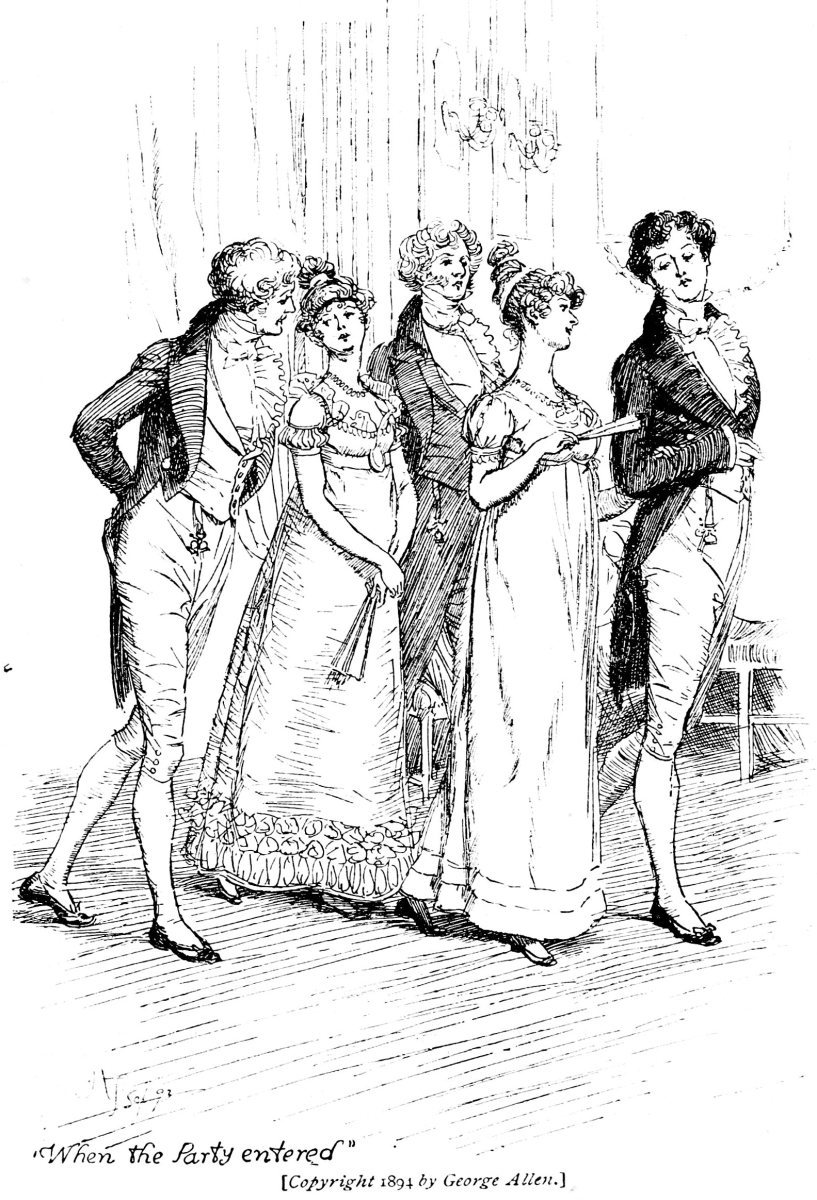
“When the Party entered”
[Copyright 1894 by George Allen.]
being gone to London only to get a large party for the ball; and a report soon followed that Mr. Bingley was to bring twelve ladies and seven gentlemen with him to the assembly. The girls grieved over such a number of ladies; but were comforted the day before the ball by hearing that, instead of twelve, he had brought only six with him from London, his five sisters and a cousin. And when the party entered the assembly-room, it consisted of only five altogether: Mr. Bingley, his two sisters, the husband of the eldest, and another young man.
Mr. Bingley was good-looking and gentlemanlike: he had a pleasant countenance, and easy, unaffected manners. His sisters were fine women, with an air of decided fashion. His brother-in-law, Mr. Hurst, merely looked the gentleman; but his friend Mr. Darcy soon drew the attention of the room by his fine, tall person, handsome features, noble mien, and the report, which was in general circulation within five minutes after his entrance, of his having ten thousand a year. The gentlemen pronounced him to be a fine figure of a man, the ladies declared he was much handsomer than Mr. Bingley, and he was looked at with great admiration for about half the evening, till his manners gave a disgust which turned the tide of his popularity; for he was discovered to be proud, to be above his company, and above being pleased; and not all his large estate in Derbyshire could save him from having a most forbidding, disagreeable countenance, and being unworthy to be compared with his friend.
Mr. Bingley had soon made himself acquainted with all the principal people in the room: he was lively and unreserved, danced every dance, was angry that the ball closed so early, and talked of giving one himself at Netherfield. Such amiable qualities must speak for themselves. What a contrast between him and his friend! Mr. Darcy danced only once with Mrs. Hurst and once with Miss Bingley, declined being introduced to any other lady, and spent the rest of the evening in walking about the room, speaking occasionally to one of his own party. His character was decided. He was the proudest, most disagreeable man in the world, and everybody hoped that he would never come there again. Amongst the most violent against him was Mrs. Bennet, whose dislike of his general behaviour was sharpened into particular resentment by his having slighted one of her daughters.
Elizabeth Bennet had been obliged, by the scarcity of gentlemen, to sit down for two dances; and during part of that time, Mr. Darcy had been standing near enough for her to overhear a conversation between him and Mr. Bingley, who came from the dance for a few minutes to press his friend to join it.
“Come, Darcy,” said he, “I must have you dance. I hate to see you standing about by yourself in this stupid manner. You had much better dance.”
“I certainly shall not. You know how I detest it, unless I am particularly acquainted with my partner. At such an assembly as this, it would be insupportable. Your sisters are engaged, and there is not another woman in the room whom it would not be a punishment to me to stand up with.”
“I would not be so fastidious as you are,” cried Bingley, “for a kingdom! Upon my honour, I never met with so many pleasant girls in my life as I have this evening; and there are several of them, you see, uncommonly pretty.”
“You are dancing with the only handsome girl in the room,” said Mr. Darcy, looking at the eldest Miss Bennet.
“Oh, she is the most beautiful creature I ever beheld! But there is one of her sisters sitting down just behind you, who is very pretty, and I dare say very agreeable. Do let me ask my partner to introduce you.”

“She is tolerable”
[Copyright 1894 by George Allen.]
“Which do you mean?” and turning round, he looked for a moment at Elizabeth, till, catching her eye, he withdrew his own, and coldly said, “She is tolerable: but not handsome enough to tempt me; and I am in no humour at present to give consequence to young ladies who are slighted by other men. You had better return to your partner and enjoy her smiles, for you are wasting your time with me.”
Mr. Bingley followed his advice. Mr. Darcy walked off; and Elizabeth remained with no very cordial feelings towards him. She told the story, however, with great spirit among her friends; for she had a lively, playful disposition, which delighted in anything ridiculous.
The evening altogether passed off pleasantly to the whole family. Mrs. Bennet had seen her eldest daughter much admired by the Netherfield party. Mr. Bingley had danced with her twice, and she had been distinguished by his sisters. Jane was as much gratified by this as her mother could be, though in a quieter way. Elizabeth felt Jane’s pleasure. Mary had heard herself mentioned to Miss Bingley as the most accomplished girl in the neighbourhood; and Catherine and Lydia had been fortunate enough to be never without partners, which was all that they had yet learnt to care for at a ball. They returned, therefore, in good spirits to Longbourn, the village where they lived, and of which they were the principal inhabitants. They found Mr. Bennet still up. With a book, he was regardless of time; and on the present occasion he had a good deal of curiosity as to the event of an evening which had raised such splendid expectations. He had rather hoped that all his wife’s views on the stranger would be disappointed; but he soon found that he had a very different story to hear.
“Oh, my dear Mr. Bennet,” as she entered the room, “we have had a most delightful evening, a most excellent ball. I wish you had been there. Jane was so admired, nothing could be like it. Everybody said how well she looked; and Mr. Bingley thought her quite beautiful, and danced with her twice. Only think of that, my dear: he actually danced with her twice; and she was the only creature in the room that he asked a second time. First of all, he asked Miss Lucas. I was so vexed to see him stand up with her; but, however, he did not admire her at all; indeed, nobody can, you know; and he seemed quite struck with Jane as she was going down the dance. So he inquired who she was, and got introduced, and asked her for the two next. Then, the two third he danced with Miss King, and the two fourth with Maria Lucas, and the two fifth with Jane again, and the two sixth with Lizzy, and the Boulanger——”
“If he had had any compassion for me,” cried her husband impatiently, “he would not have danced half so much! For God’s sake, say no more of his partners. O that he had sprained his ancle in the first dance!”
“Oh, my dear,” continued Mrs. Bennet, “I am quite delighted with him. He is so excessively handsome! and his sisters are charming women. I never in my life saw anything more elegant than their dresses. I dare say the lace upon Mrs. Hurst’s gown——”
Here she was interrupted again. Mr. Bennet protested against any description of finery. She was therefore obliged to seek another branch of the subject, and related, with much bitterness of spirit, and some exaggeration, the shocking rudeness of Mr. Darcy.
“But I can assure you,” she added, “that Lizzy does not lose much by not suiting his fancy; for he is a most disagreeable, horrid man, not at all worth pleasing. So high and so conceited, that there was no enduring him! He walked here, and he walked there, fancying himself so very great! Not handsome enough to dance with! I wish you had been there, my dear, to have given him one of your set-downs. I quite detest the man.”
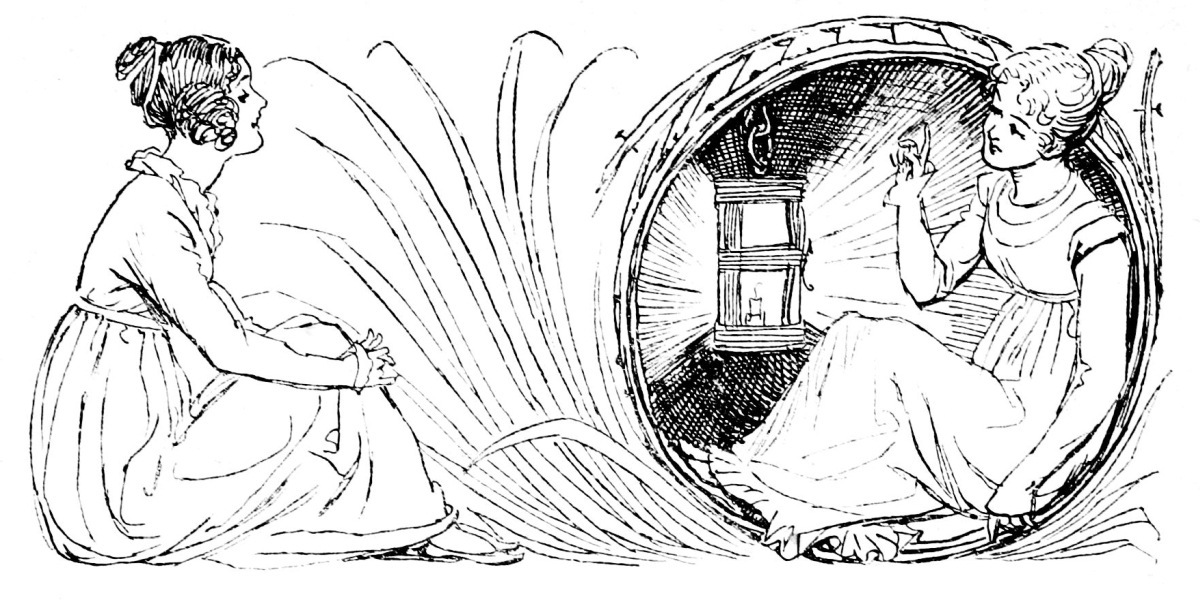
CHAPTER IV.
 HEN Jane and Elizabeth were alone, the former, who had been cautious in her praise of Mr. Bingley before, expressed to her sister how very much she admired him.
HEN Jane and Elizabeth were alone, the former, who had been cautious in her praise of Mr. Bingley before, expressed to her sister how very much she admired him.
“He is just what a young-man ought to be,” said she, “sensible, good-humoured, lively; and I never saw such happy manners! so much ease, with such perfect good breeding!”
“He is also handsome,” replied Elizabeth, “which a young man ought likewise to be if he possibly can. His character is thereby complete.”
“I was very much flattered by his asking me to dance a second time. I did not expect such a compliment.”
“Did not you? I did for you. But that is one great difference between us. Compliments always take you by surprise, and me never. What could be more natural than his asking you again? He could not help seeing that you were about five times as pretty as every other woman in the room. No thanks to his gallantry for that. Well, he certainly is very agreeable, and I give you leave to like him. You have liked many a stupider person.”
“Dear Lizzy!”
“Oh, you are a great deal too apt, you know, to like people in general. You never see a fault in anybody. All the world are good and agreeable in your eyes. I never heard you speak ill of a human being in my life.”
“I would wish not to be hasty in censuring anyone; but I always speak what I think.”
“I know you do: and it is that which makes the wonder. With your good sense, to be so honestly blind to the follies and nonsense of others! Affectation of candour is common enough; one meets with it everywhere. But to be candid without ostentation or design,—to take the good of everybody’s character and make it still better, and say nothing of the bad,—belongs to you alone. And so, you like this man’s sisters, too, do you? Their manners are not equal to his.”
“Certainly not, at first; but they are very pleasing women when you converse with them. Miss Bingley is to live with her brother, and keep his house; and I am much mistaken if we shall not find a very charming neighbour in her.”
Elizabeth listened in silence, but was not convinced: their behaviour at the assembly had not been calculated to please in general; and with more quickness of observation and less pliancy of temper than her sister, and with a judgment, too, unassailed by any attention to herself, she was very little disposed to approve them. They were, in fact, very fine ladies; not deficient in good-humour when they were pleased, nor in the power of being agreeable where they chose it; but proud and conceited. They were rather handsome; had been educated in one of the first private seminaries in town; had a fortune of twenty thousand pounds; were in the habit of spending more than they ought, and of associating with people of rank; and were, therefore, in every respect entitled to think well of themselves and meanly of others. They were of a respectable family in the north of England; a circumstance more deeply impressed on their memories than that their brother’s fortune and their own had been acquired by trade.
Mr. Bingley inherited property to the amount of nearly a hundred thousand pounds from his father, who had intended to purchase an estate, but did not live to do it. Mr. Bingley intended it likewise, and sometimes made choice of his county; but, as he was now provided with a good house and the liberty of a manor, it was doubtful to many of those who best knew the easiness of his temper, whether he might not spend the remainder of his days at Netherfield, and leave the next generation to purchase.
His sisters were very anxious for his having an estate of his own; but though he was now established only as a tenant, Miss Bingley was by no means unwilling to preside at his table; nor was Mrs. Hurst, who had married a man of more fashion than fortune, less disposed to consider his house as her home when it suited her. Mr. Bingley had not been of age two years when he was tempted, by an accidental recommendation, to look at Netherfield House. He did look at it, and into it, for half an hour; was pleased with the situation and the principal rooms, satisfied with what the owner said in its praise, and took it immediately.
Between him and Darcy there was a very steady friendship, in spite of a great opposition of character. Bingley was endeared to Darcy by the easiness, openness, and ductility of his temper, though no disposition could offer a greater contrast to his own, and though with his own he never appeared dissatisfied. On the strength of Darcy’s regard, Bingley had the firmest reliance, and of his judgment the highest opinion. In understanding, Darcy was the superior. Bingley was by no means deficient; but Darcy was clever. He was at the same time haughty, reserved, and fastidious; and his manners, though well bred, were not inviting. In that respect his friend had greatly the advantage. Bingley was sure of being liked wherever he appeared; Darcy was continually giving offence.
The manner in which they spoke of the Meryton assembly was sufficiently characteristic. Bingley had never met with pleasanter people or prettier girls in his life; everybody had been most kind and attentive to him; there had been no formality, no stiffness; he had soon felt acquainted with all the room; and as to Miss Bennet, he could not conceive an angel more beautiful. Darcy, on the contrary, had seen a collection of people in whom there was little beauty and no fashion, for none of whom he had felt the smallest interest, and from none received either attention or pleasure. Miss Bennet he acknowledged to be pretty; but she smiled too much.
Mrs. Hurst and her sister allowed it to be so; but still they admired her and liked her, and pronounced her to be a sweet girl, and one whom they should not object to know more of. Miss Bennet was therefore established as a sweet girl; and their brother felt authorized by such commendation to think of her as he chose.
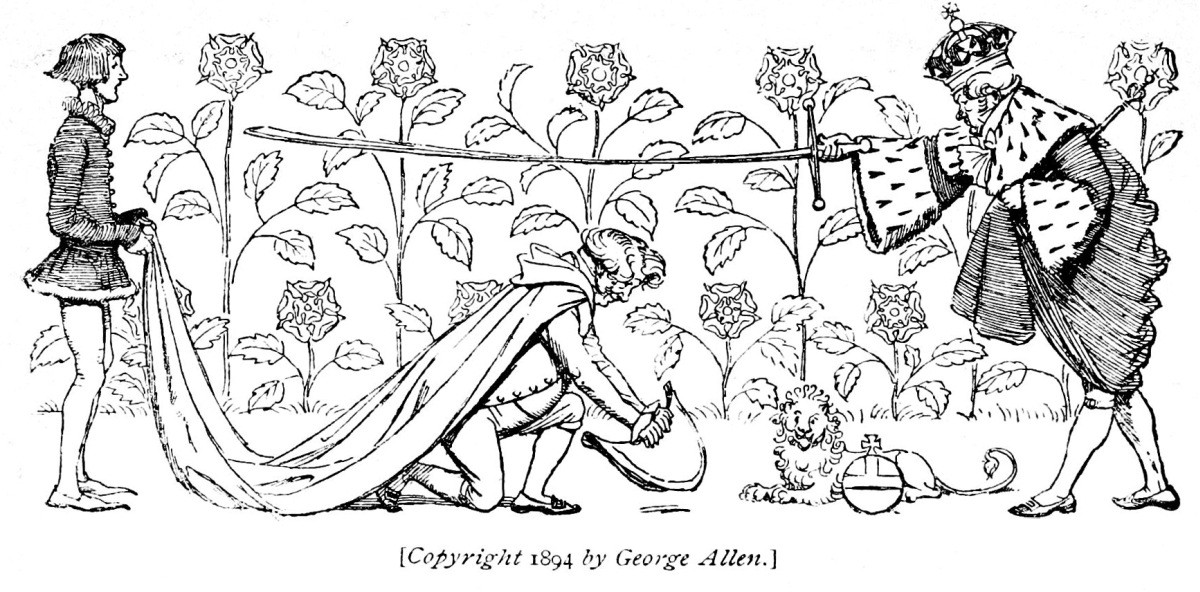
CHAPTER V.
 ITHIN a short walk of Longbourn lived a family with whom the Bennets were particularly intimate. Sir William Lucas had been formerly in trade in Meryton, where he had made a tolerable fortune, and risen to the honour of knighthood by an address to the king during his mayoralty. The distinction had, perhaps, been felt too strongly. It had given him a disgust to his business and to his residence in a small market town; and, quitting them both, he had removed with his family to a house about a mile from Meryton, denominated from that period Lucas Lodge; where he could think with pleasure of his own importance, and, unshackled by business, occupy himself solely in being civil to all the world. For, though elated by his rank, it did not render him supercilious; on the contrary, he was all attention to everybody. By nature inoffensive, friendly, and obliging, his presentation at St. James’s had made him courteous.
ITHIN a short walk of Longbourn lived a family with whom the Bennets were particularly intimate. Sir William Lucas had been formerly in trade in Meryton, where he had made a tolerable fortune, and risen to the honour of knighthood by an address to the king during his mayoralty. The distinction had, perhaps, been felt too strongly. It had given him a disgust to his business and to his residence in a small market town; and, quitting them both, he had removed with his family to a house about a mile from Meryton, denominated from that period Lucas Lodge; where he could think with pleasure of his own importance, and, unshackled by business, occupy himself solely in being civil to all the world. For, though elated by his rank, it did not render him supercilious; on the contrary, he was all attention to everybody. By nature inoffensive, friendly, and obliging, his presentation at St. James’s had made him courteous.
Lady Lucas was a very good kind of woman, not too clever to be a valuable neighbour to Mrs. Bennet. They had several children. The eldest of them, a sensible, intelligent young woman, about twenty-seven, was Elizabeth’s intimate friend.
That the Miss Lucases and the Miss Bennets should meet to talk over a ball was absolutely necessary; and the morning after the assembly brought the former to Longbourn to hear and to communicate.
“You began the evening well, Charlotte,” said Mrs. Bennet, with civil self-command, to Miss Lucas. “You were Mr. Bingley’s first choice.”
“Yes; but he seemed to like his second better.”
“Oh, you mean Jane, I suppose, because he danced with her twice. To be sure that did seem as if he admired her—indeed, I rather believe he did—I heard something about it—but I hardly know what—something about Mr. Robinson.”
“Perhaps you mean what I overheard between him and Mr. Robinson: did not I mention it to you? Mr. Robinson’s asking him how he liked our Meryton assemblies, and whether he did not think there were a great many pretty women in the room, and which he thought the prettiest? and his answering immediately to the last question, ‘Oh, the eldest Miss Bennet, beyond a doubt: there cannot be two opinions on that point.’”
“Upon my word! Well, that was very decided, indeed—that does seem as if—but, however, it may all come to nothing, you know.”
“My overhearings were more to the purpose than yours, Eliza,” said Charlotte. “Mr. Darcy is not so well worth listening to as his friend, is he? Poor Eliza! to be only just tolerable.”
“I beg you will not put it into Lizzy’s head to be vexed by his ill-treatment, for he is such a disagreeable man that it would be quite a misfortune to be liked by him. Mrs. Long told me last night that he sat close to her for half an hour without once opening his lips.”
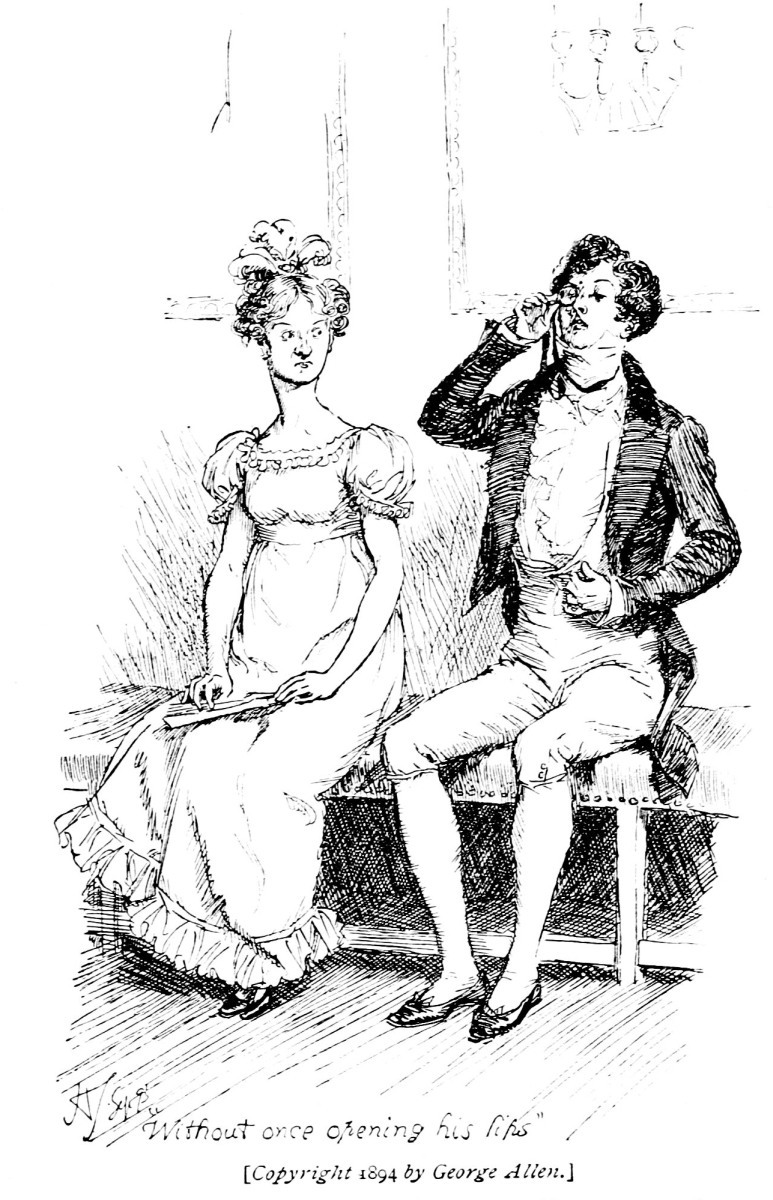
“Without once opening his lips”
[Copyright 1894 by George Allen.]
“Are you quite sure, ma’am? Is not there a little mistake?” said Jane. “I certainly saw Mr. Darcy speaking to her.”
“Ay, because she asked him at last how he liked Netherfield, and he could not help answering her; but she said he seemed very angry at being spoke to.”
“Miss Bingley told me,” said Jane, “that he never speaks much unless among his intimate acquaintance. With them he is remarkably agreeable.”
“I do not believe a word of it, my dear. If he had been so very agreeable, he would have talked to Mrs. Long. But I can guess how it was; everybody says that he is eat up with pride, and I dare say he had heard somehow that Mrs. Long does not keep a carriage, and had to come to the ball in a hack chaise.”
“I do not mind his not talking to Mrs. Long,” said Miss Lucas, “but I wish he had danced with Eliza.”
“Another time, Lizzy,” said her mother, “I would not dance with him, if I were you.”
“I believe, ma’am, I may safely promise you never to dance with him.”
“His pride,” said Miss Lucas, “does not offend me so much as pride often does, because there is an excuse for it. One cannot wonder that so very fine a young man, with family, fortune, everything in his favour, should think highly of himself. If I may so express it, he has a right to be proud.”
“That is very true,” replied Elizabeth, “and I could easily forgive his pride, if he had not mortified mine.”
“Pride,” observed Mary, who piqued herself upon the solidity of her reflections, “is a very common failing, I believe. By all that I have ever read, I am convinced that it is very common indeed; that human nature is particularly prone to it, and that there are very few of us who do not cherish a feeling of self-complacency on the score of some quality or other, real or imaginary. Vanity and pride are different things, though the words are often used synonymously. A person may be proud without being vain. Pride relates more to our opinion of ourselves; vanity to what we would have others think of us.”
“If I were as rich as Mr. Darcy,” cried a young Lucas, who came with his sisters, “I should not care how proud I was. I would keep a pack of foxhounds, and drink a bottle of wine every day.”
“Then you would drink a great deal more than you ought,” said Mrs. Bennet; “and if I were to see you at it, I should take away your bottle directly.”
The boy protested that she should not; she continued to declare that she would; and the argument ended only with the visit.
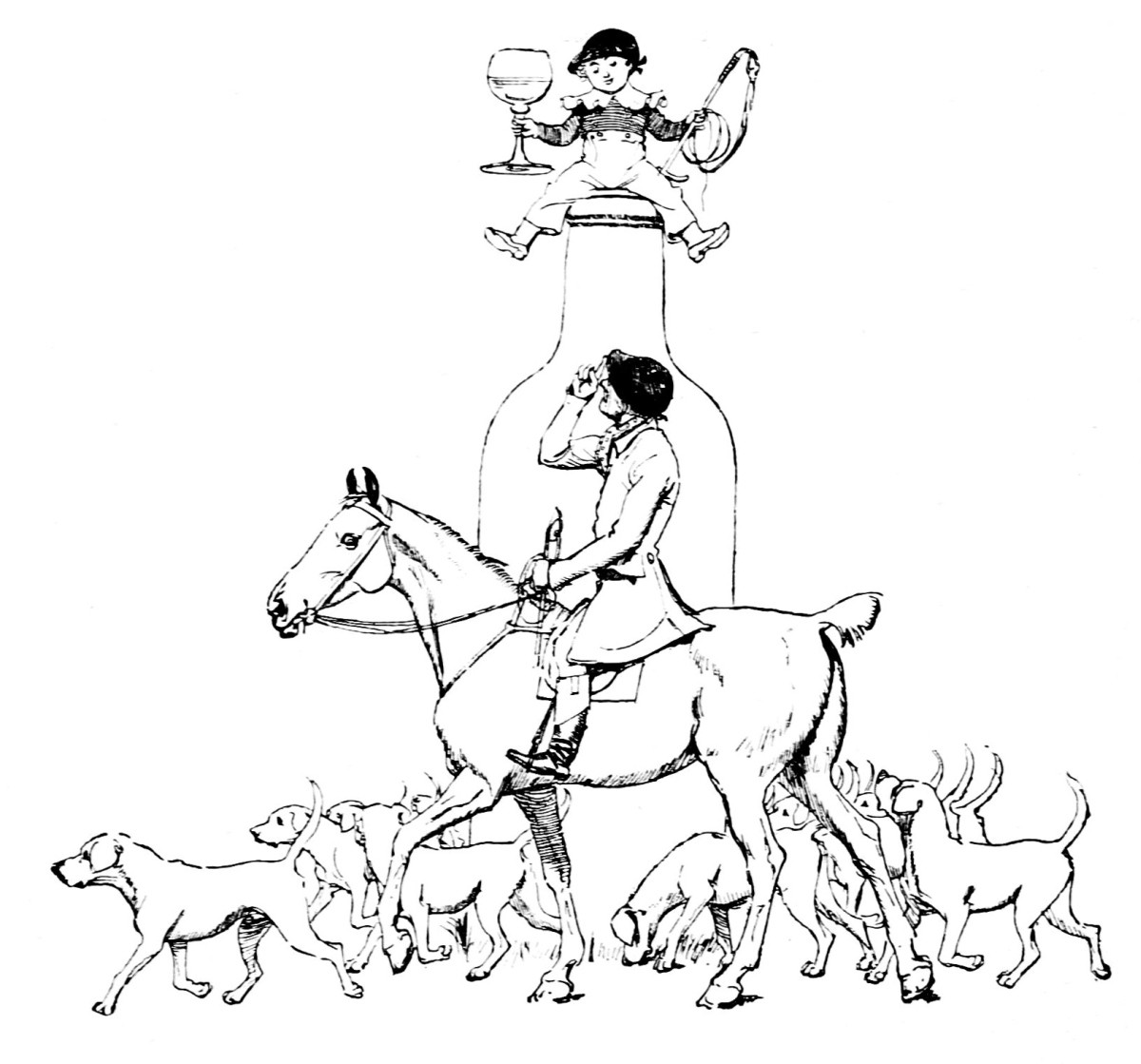
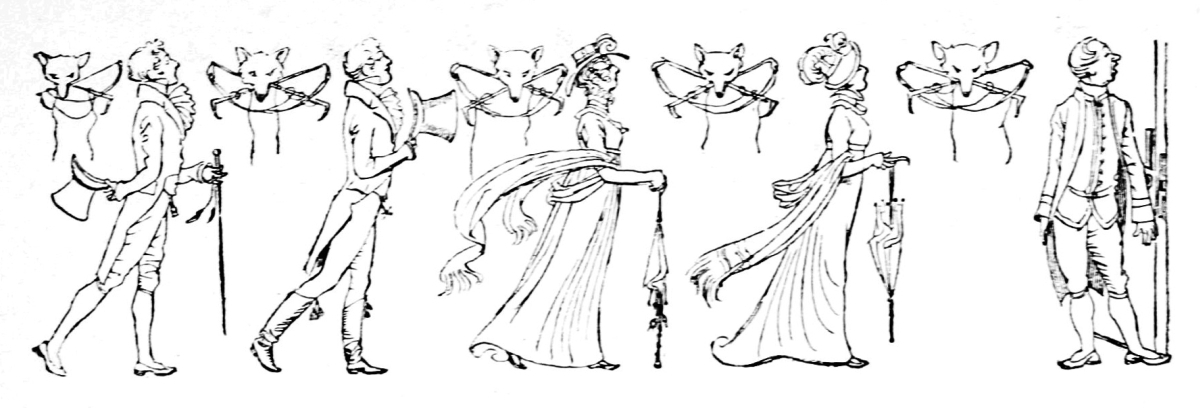
CHAPTER VI.
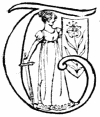 HE ladies of Longbourn soon waited on those of Netherfield. The visit was returned in due form. Miss Bennet’s pleasing manners grew on the good-will of Mrs. Hurst and Miss Bingley; and though the mother was found to be intolerable, and the younger sisters not worth speaking to, a wish of being better acquainted with them was expressed towards the two eldest. By Jane this attention was received with the greatest pleasure; but Elizabeth still saw superciliousness in their treatment of everybody, hardly excepting even her sister, and could not like them; though their kindness to Jane, such as it was, had a value, as arising, in all probability, from the influence of their brother’s admiration. It was generally evident, whenever they met, that he did admire her; and to her it was equally evident that Jane was yielding to the preference which she had begun to entertain for him from the first, and was in a way to be very much in love; but she considered with pleasure that it was not likely to be discovered by the world in general, since Jane united with great strength of feeling, a composure of temper and an uniform cheerfulness of manner, which would guard her from the suspicions of the impertinent. She mentioned this to her friend, Miss Lucas.
HE ladies of Longbourn soon waited on those of Netherfield. The visit was returned in due form. Miss Bennet’s pleasing manners grew on the good-will of Mrs. Hurst and Miss Bingley; and though the mother was found to be intolerable, and the younger sisters not worth speaking to, a wish of being better acquainted with them was expressed towards the two eldest. By Jane this attention was received with the greatest pleasure; but Elizabeth still saw superciliousness in their treatment of everybody, hardly excepting even her sister, and could not like them; though their kindness to Jane, such as it was, had a value, as arising, in all probability, from the influence of their brother’s admiration. It was generally evident, whenever they met, that he did admire her; and to her it was equally evident that Jane was yielding to the preference which she had begun to entertain for him from the first, and was in a way to be very much in love; but she considered with pleasure that it was not likely to be discovered by the world in general, since Jane united with great strength of feeling, a composure of temper and an uniform cheerfulness of manner, which would guard her from the suspicions of the impertinent. She mentioned this to her friend, Miss Lucas.
“It may, perhaps, be pleasant,” replied Charlotte, “to be able to impose on the public in such a case; but it is sometimes a disadvantage to be so very guarded. If a woman conceals her affection with the same skill from the object of it, she may lose the opportunity of fixing him; and it will then be but poor consolation to believe the world equally in the dark. There is so much of gratitude or vanity in almost every attachment, that it is not safe to leave any to itself. We can all begin freely—a slight preference is natural enough; but there are very few of us who have heart enough to be really in love without encouragement. In nine cases out of ten, a woman had better show more affection than she feels. Bingley likes your sister undoubtedly; but he may never do more than like her, if she does not help him on.”
“But she does help him on, as much as her nature will allow. If I can perceive her regard for him, he must be a simpleton indeed not to discover it too.”
“Remember, Eliza, that he does not know Jane’s disposition as you do.”
“But if a woman is partial to a man, and does not endeavor to conceal it, he must find it out.”
“Perhaps he must, if he sees enough of her. But though Bingley and Jane meet tolerably often, it is never for many hours together; and as they always see each other in large mixed parties, it is impossible that every moment should be employed in conversing together. Jane should therefore make the most of every half hour in which she can command his attention. When she is secure of him, there will be leisure for falling in love as much as she chooses.”
“Your plan is a good one,” replied Elizabeth, “where nothing is in question but the desire of being well married; and if I were determined to get a rich husband, or any husband, I dare say I should adopt it. But these are not Jane’s feelings; she is not acting by design. As yet she cannot even be certain of the degree of her own regard, nor of its reasonableness. She has known him only a fortnight. She danced four dances with him at Meryton; she saw him one morning at his own house, and has since dined in company with him four times. This is not quite enough to make her understand his character.”
“Not as you represent it. Had she merely dined with him, she might only have discovered whether he had a good appetite; but you must remember that four evenings have been also spent together—and four evenings may do a great deal.”
“Yes: these four evenings have enabled them to ascertain that they both like Vingt-un better than Commerce, but with respect to any other leading characteristic, I do not imagine that much has been unfolded.”
“Well,” said Charlotte, “I wish Jane success with all my heart; and if she were married to him to-morrow, I should think she had as good a chance of happiness as if she were to be studying his character for a twelvemonth. Happiness in marriage is entirely a matter of chance. If the dispositions of the parties are ever so well known to each other, or ever so similar beforehand, it does not advance their felicity in the least. They always continue to grow sufficiently unlike afterwards to have their share of vexation; and it is better to know as little as possible of the defects of the person with whom you are to pass your life.”
“You make me laugh, Charlotte; but it is not sound. You know it is not sound, and that you would never act in this way yourself.”
Occupied in observing Mr. Bingley’s attention to her sister, Elizabeth was far from suspecting that she was herself becoming an object of some interest in the eyes of his friend. Mr. Darcy had at first scarcely allowed her to be pretty: he had looked at her without admiration at the ball; and when they next met, he looked at her only to criticise. But no sooner had he made it clear to himself and his friends that she had hardly a good feature in her face, than he began to find it was rendered uncommonly intelligent by the beautiful expression of her dark eyes. To this discovery succeeded some others equally mortifying. Though he had detected with a critical eye more than one failure of perfect symmetry in her form, he was forced to acknowledge her figure to be light and pleasing; and in spite of his asserting that her manners were not those of the fashionable world, he was caught by their easy playfulness. Of this she was perfectly unaware: to her he was only the man who made himself agreeable nowhere, and who had not thought her handsome enough to dance with.
He began to wish to know more of her; and, as a step towards conversing with her himself, attended to her conversation with others. His doing so drew her notice. It was at Sir William Lucas’s, where a large party were assembled.
“What does Mr. Darcy mean,” said she to Charlotte, “by listening to my conversation with Colonel Forster?”
“That is a question which Mr. Darcy only can answer.”
“But if he does it any more, I shall certainly let him know that I see what he is about. He has a very satirical eye, and if I do not begin by being impertinent myself, I shall soon grow afraid of him.”
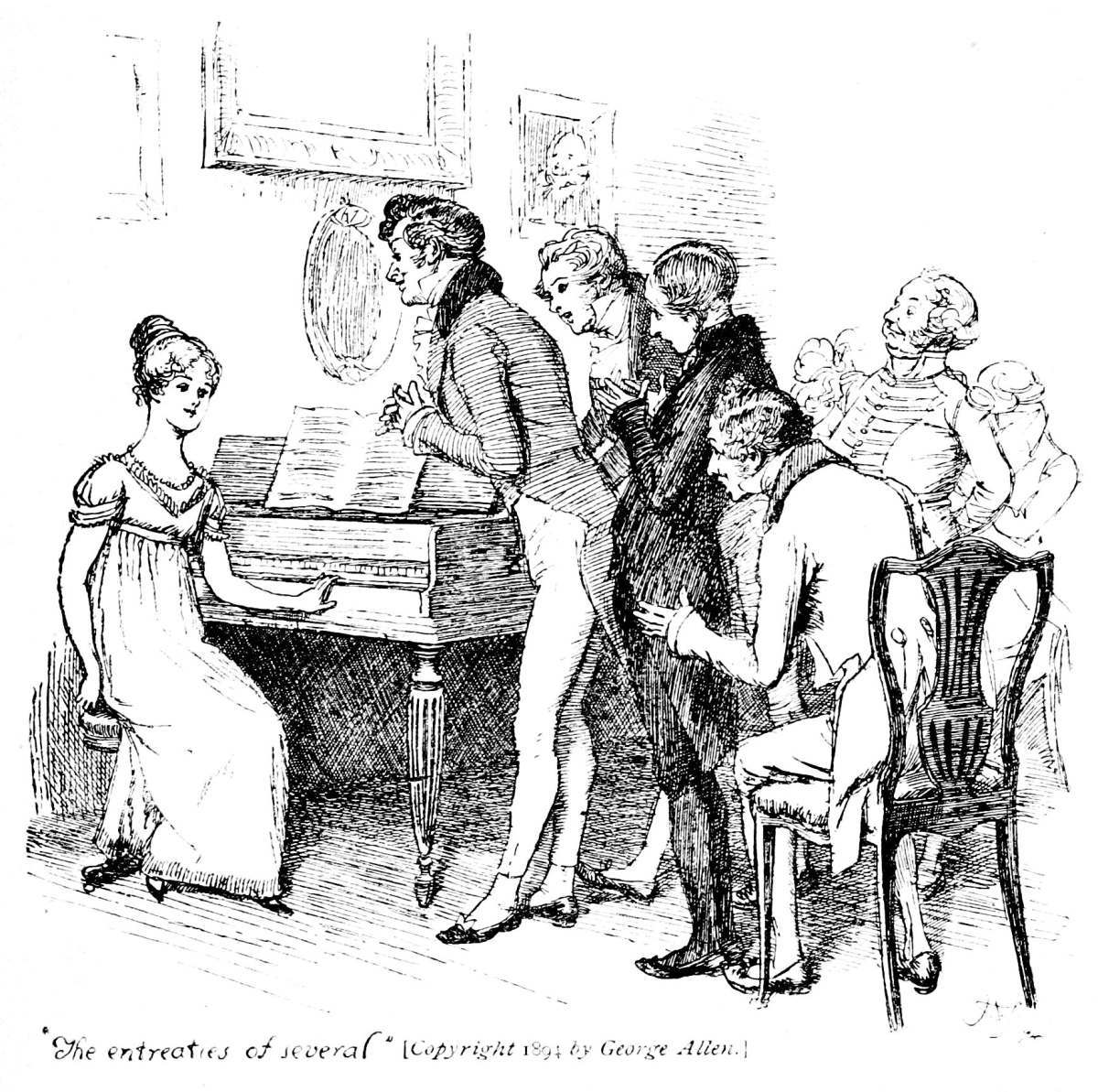
“The entreaties of several” [Copyright 1894 by George Allen.]
On his approaching them soon afterwards, though without seeming to have any intention of speaking, Miss Lucas defied her friend to mention such a subject to him, which immediately provoking Elizabeth to do it, she turned to him and said,—
“Did not you think, Mr. Darcy, that I expressed myself uncommonly well just now, when I was teasing Colonel Forster to give us a ball at Meryton?”
“With great energy; but it is a subject which always makes a lady energetic.”
“You are severe on us.”
“It will be her turn soon to be teased,” said Miss Lucas. “I am going to open the instrument, Eliza, and you know what follows.”
“You are a very strange creature by way of a friend!—always wanting me to play and sing before anybody and everybody! If my vanity had taken a musical turn, you would have been invaluable; but as it is, I would really rather not sit down before those who must be in the habit of hearing the very best performers.” On Miss Lucas’s persevering, however, she added, “Very well; if it must be so, it must.” And gravely glancing at Mr. Darcy, “There is a very fine old saying, which everybody here is of course familiar with—‘Keep your breath to cool your porridge,’—and I shall keep mine to swell my song.”
Her performance was pleasing, though by no means capital. After a song or two, and before she could reply to the entreaties of several that she would sing again, she was eagerly succeeded at the instrument by her sister Mary, who having, in consequence of being the only plain one in the family, worked hard for knowledge and accomplishments, was always impatient for display.
Mary had neither genius nor taste; and though vanity had given her application, it had given her likewise a pedantic air and conceited manner, which would have injured a higher degree of excellence than she had reached. Elizabeth, easy and unaffected, had been listened to with much more pleasure, though not playing half so well; and Mary, at the end of a long concerto, was glad to purchase praise and gratitude by Scotch and Irish airs, at the request of her younger sisters, who with some of the Lucases, and two or three officers, joined eagerly in dancing at one end of the room.
Mr. Darcy stood near them in silent indignation at such a mode of passing the evening, to the exclusion of all conversation, and was too much engrossed by his own thoughts to perceive that Sir William Lucas was his neighbour, till Sir William thus began:—
“What a charming amusement for young people this is, Mr. Darcy! There is nothing like dancing, after all. I consider it as one of the first refinements of polished societies.”
“Certainly, sir; and it has the advantage also of being in vogue amongst the less polished societies of the world: every savage can dance.”
Sir William only smiled. “Your friend performs delightfully,” he continued, after a pause, on seeing Bingley join the group; “and I doubt not that you are an adept in the science yourself, Mr. Darcy.”
“You saw me dance at Meryton, I believe, sir.”
“Yes, indeed, and received no inconsiderable pleasure from the sight. Do you often dance at St. James’s?”
“Never, sir.”
“Do you not think it would be a proper compliment to the place?”
“It is a compliment which I never pay to any place if I can avoid it.”
“You have a house in town, I conclude?”
Mr. Darcy bowed.
“I had once some thoughts of fixing in town myself, for I am fond of superior society; but I did not feel quite certain that the air of London would agree with Lady Lucas.”
He paused in hopes of an answer: but his companion was not disposed to make any; and Elizabeth at that instant moving towards them, he was struck with the notion of doing a very gallant thing, and called out to her,—
“My dear Miss Eliza, why are not you dancing? Mr. Darcy, you must allow me to present this young lady to you as a very desirable partner. You cannot refuse to dance, I am sure, when so much beauty is before you.” And, taking her hand, he would have given it to Mr. Darcy, who, though extremely surprised, was not unwilling to receive it, when she instantly drew back, and said with some discomposure to Sir William,—
“Indeed, sir, I have not the least intention of dancing. I entreat you not to suppose that I moved this way in order to beg for a partner.”
Mr. Darcy, with grave propriety, requested to be allowed the honour of her hand, but in vain. Elizabeth was determined; nor did Sir William at all shake her purpose by his attempt at persuasion.
“You excel so much in the dance, Miss Eliza, that it is cruel to deny me the happiness of seeing you; and though this gentleman dislikes the amusement in general, he can have no objection, I am sure, to oblige us for one half hour.”
“Mr. Darcy is all politeness,” said Elizabeth, smiling.
“He is, indeed: but considering the inducement, my dear Miss Eliza, we cannot wonder at his complaisance; for who would object to such a partner?”
Elizabeth looked archly, and turned away. Her resistance had not injured her with the gentleman, and he was thinking of her with some complacency, when thus accosted by Miss Bingley,—
“I can guess the subject of your reverie.”
“I should imagine not.”
“You are considering how insupportable it would be to pass many evenings in this manner,—in such society; and, indeed, I am quite of your opinion. I was never more annoyed! The insipidity, and yet the noise—the nothingness, and yet the self-importance, of all these people! What would I give to hear your strictures on them!”
“Your conjecture is totally wrong, I assure you. My mind was more agreeably engaged. I have been meditating on the very great pleasure which a pair of fine eyes in the face of a pretty woman can bestow.”
Miss Bingley immediately fixed her eyes on his face, and desired he would tell her what lady had the credit of inspiring such reflections. Mr. Darcy replied, with great intrepidity,—
“Miss Elizabeth Bennet.”
“Miss Elizabeth Bennet!” repeated Miss Bingley. “I am all astonishment. How long has she been such a favourite? and pray when am I to wish you joy?”
“That is exactly the question which I expected you to ask. A lady’s imagination is very rapid; it jumps from admiration to love, from love to matrimony, in a moment. I knew you would be wishing me joy.”
“Nay, if you are so serious about it, I shall consider the matter as absolutely settled. You will have a charming mother-in-law, indeed, and of course she will be always at Pemberley with you.”
He listened to her with perfect indifference, while she chose to entertain herself in this manner; and as his composure convinced her that all was safe, her wit flowed along.
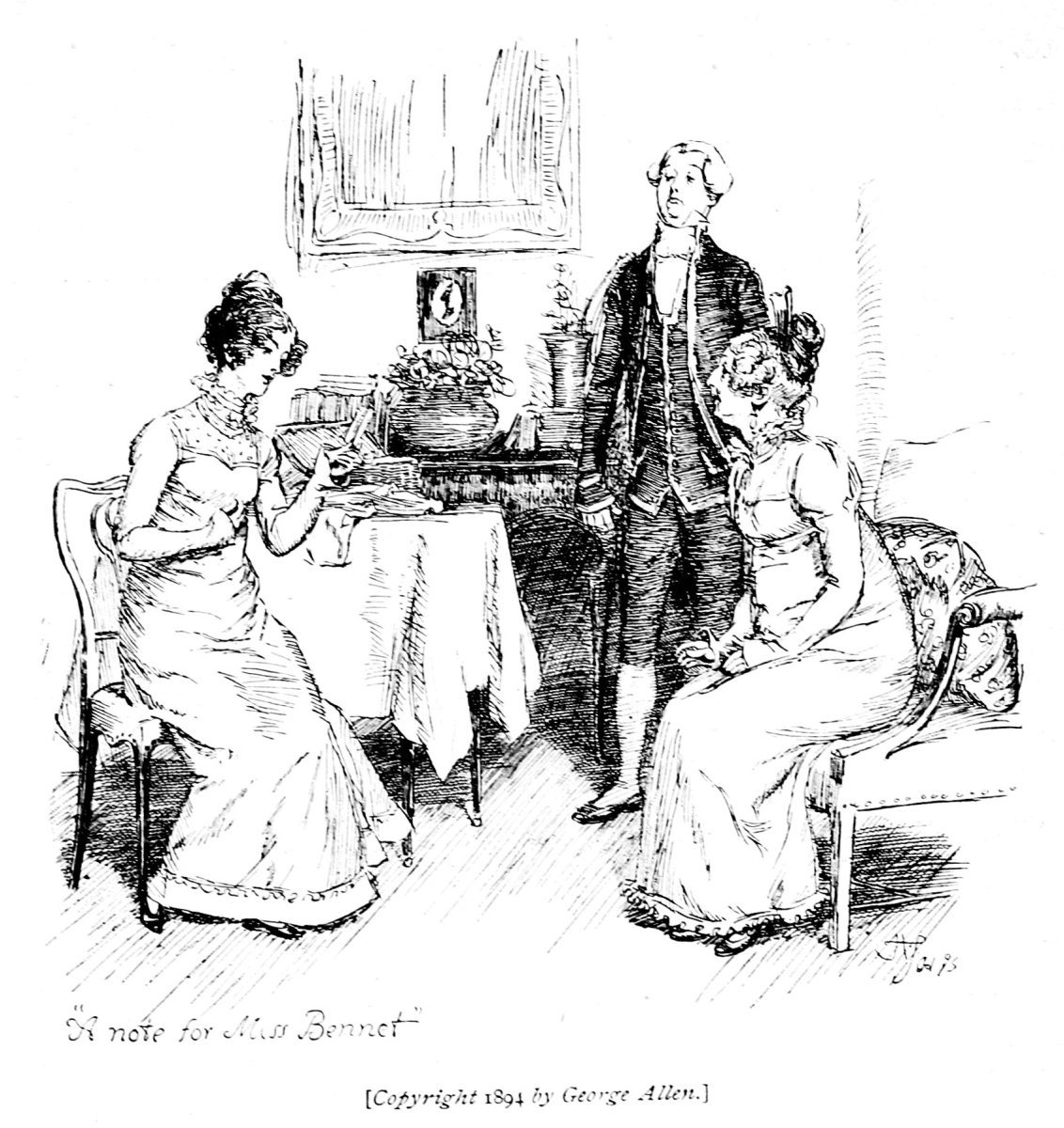
A note for Miss Bennet.
CHAPTER VII.
 R. BENNET’S property consisted almost entirely in an estate of two thousand a year, which, unfortunately for his daughters, was entailed, in default of heirs male, on a distant relation; and their mother’s fortune, though ample for her situation in life, could but ill supply the deficiency of his. Her father had been an attorney in Meryton, and had left her four thousand pounds.
R. BENNET’S property consisted almost entirely in an estate of two thousand a year, which, unfortunately for his daughters, was entailed, in default of heirs male, on a distant relation; and their mother’s fortune, though ample for her situation in life, could but ill supply the deficiency of his. Her father had been an attorney in Meryton, and had left her four thousand pounds.
She had a sister married to a Mr. Philips, who had been a clerk to their father and succeeded him in the business, and a brother settled in London in a respectable line of trade.
The village of Longbourn was only one mile from Meryton; a most convenient distance for the young ladies, who were usually tempted thither three or four times a week, to pay their duty to their aunt, and to a milliner’s shop just over the way. The two youngest of the family, Catherine and Lydia, were particularly frequent in these attentions: their minds were more vacant than their sisters’, and when nothing better offered, a walk to Meryton was necessary to amuse their morning hours and furnish conversation for the evening; and, however bare of news the country in general might be, they always contrived to learn some from their aunt. At present, indeed, they were well supplied both with news and happiness by the recent arrival of a militia regiment in the neighbourhood; it was to remain the whole winter, and Meryton was the head-quarters.
Their visits to Mrs. Philips were now productive of the most interesting intelligence. Every day added something to their knowledge of the officers’ names and connections. Their lodgings were not long a secret, and at length they began to know the officers themselves. Mr. Philips visited them all, and this opened to his nieces a source of felicity unknown before. They could talk of nothing but officers; and Mr. Bingley’s large fortune, the mention of which gave animation to their mother, was worthless in their eyes when opposed to the regimentals of an ensign.
After listening one morning to their effusions on this subject, Mr. Bennet coolly observed,—
“From all that I can collect by your manner of talking, you must be two of the silliest girls in the country. I have suspected it some time, but I am now convinced.”
Catherine was disconcerted, and made no answer; but Lydia, with perfect indifference, continued to express her admiration of Captain Carter, and her hope of seeing him in the course of the day, as he was going the next morning to London.
“I am astonished, my dear,” said Mrs. Bennet, “that you should be so ready to think your own children silly. If I wished to think slightingly of anybody’s children, it should not be of my own, however.”
“If my children are silly, I must hope to be always sensible of it.”
“Yes; but as it happens, they are all of them very clever.”
“This is the only point, I flatter myself, on which we do not agree. I had hoped that our sentiments coincided in every particular, but I must so far differ from you as to think our two youngest daughters uncommonly foolish.”
“My dear Mr. Bennet, you must not expect such girls to have the sense of their father and mother. When they get to our age, I dare say they will not think about officers any more than we do. I remember the time when I liked a red coat myself very well—and, indeed, so I do still at my heart; and if a smart young colonel, with five or six thousand a year, should want one of my girls, I shall not say nay to him; and I thought Colonel Forster looked very becoming the other night at Sir William’s in his regimentals.”
“Mamma,” cried Lydia, “my aunt says that Colonel Forster and Captain Carter do not go so often to Miss Watson’s as they did when they first came; she sees them now very often standing in Clarke’s library.”
Mrs. Bennet was prevented replying by the entrance of the footman with a note for Miss Bennet; it came from Netherfield, and the servant waited for an answer. Mrs. Bennet’s eyes sparkled with pleasure, and she was eagerly calling out, while her daughter read,—
“Well, Jane, who is it from? What is it about? What does he say? Well, Jane, make haste and tell us; make haste, my love.”
“It is from Miss Bingley,” said Jane, and then read it aloud.
“My dear friend,
“If you are not so compassionate as to dine to-day with Louisa and me, we shall be in danger of hating each other for the rest of our lives; for a whole day’s tête-à-tête between two women can never end without a quarrel. Come as soon as you can on the receipt of this. My brother and the gentlemen are to dine with the officers. Yours ever,
“Caroline Bingley.”
“With the officers!” cried Lydia: “I wonder my aunt did not tell us of that.”
“Dining out,” said Mrs. Bennet; “that is very unlucky.”
“Can I have the carriage?” said Jane.
“No, my dear, you had better go on horseback, because it seems likely to rain; and then you must stay all night.”
“That would be a good scheme,” said Elizabeth, “if you were sure that they would not offer to send her home.”
“Oh, but the gentlemen will have Mr. Bingley’s chaise to go to Meryton; and the Hursts have no horses to theirs.”
“I had much rather go in the coach.”
“But, my dear, your father cannot spare the horses, I am sure. They are wanted in the farm, Mr. Bennet, are not they?”
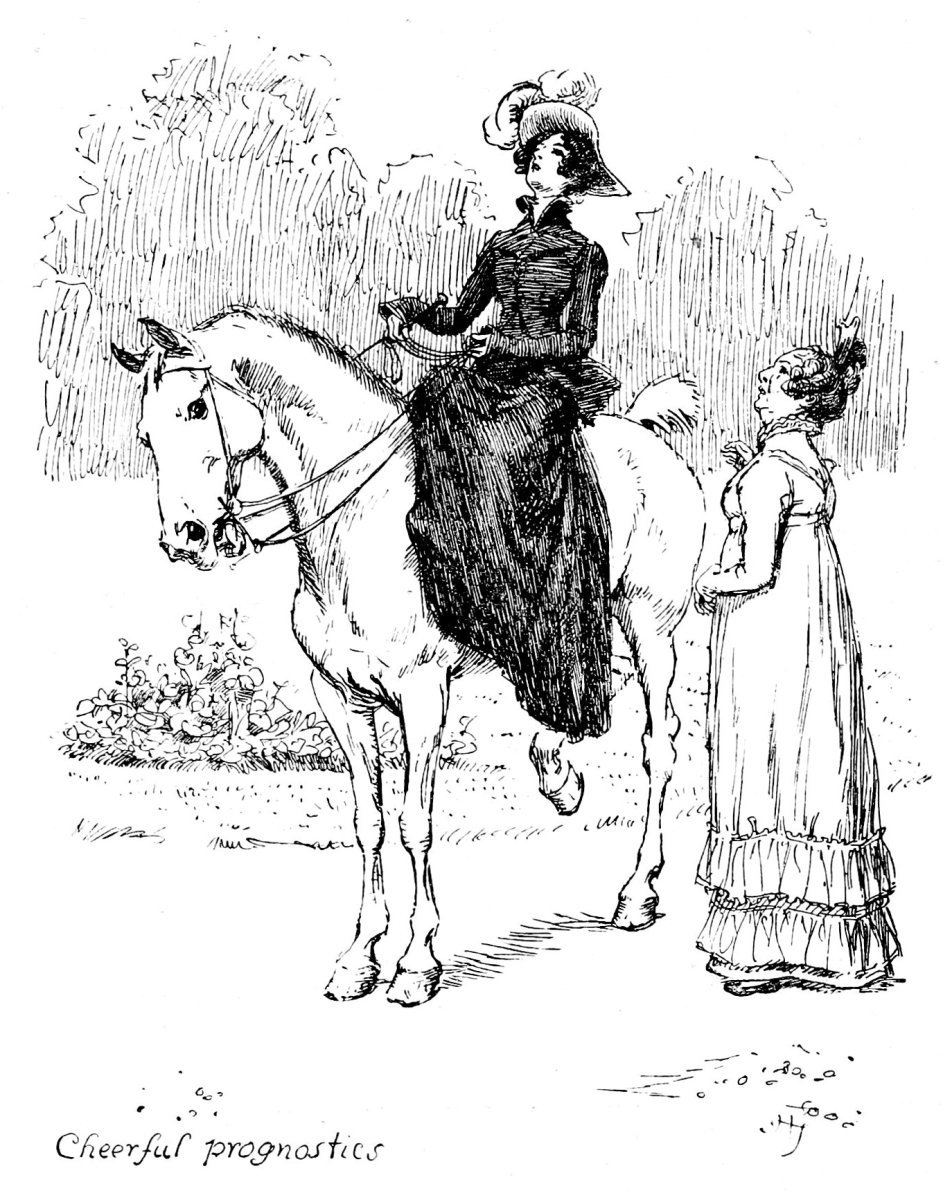
Cheerful prognostics
“They are wanted in the farm much oftener than I can get them.”
“But if you have got them to-day,” said Elizabeth, “my mother’s purpose will be answered.”
She did at last extort from her father an acknowledgment that the horses were engaged; Jane was therefore obliged to go on horseback, and her mother attended her to the door with many cheerful prognostics of a bad day. Her hopes were answered; Jane had not been gone long before it rained hard. Her sisters were uneasy for her, but her mother was delighted. The rain continued the whole evening without intermission; Jane certainly could not come back.
“This was a lucky idea of mine, indeed!” said Mrs. Bennet, more than once, as if the credit of making it rain were all her own. Till the next morning, however, she was not aware of all the felicity of her contrivance. Breakfast was scarcely over when a servant from Netherfield brought the following note for Elizabeth:—
“My dearest Lizzie,
“I find myself very unwell this morning, which, I suppose, is to be imputed to my getting wet through yesterday. My kind friends will not hear of my returning home till I am better. They insist also on my seeing Mr. Jones—therefore do not be alarmed if you should hear of his having been to me—and, excepting a sore throat and a headache, there is not much the matter with me.
“Yours, etc.”
“Well, my dear,” said Mr. Bennet, when Elizabeth had read the note aloud, “if your daughter should have a dangerous fit of illness—if she should die—it would be a comfort to know that it was all in pursuit of Mr. Bingley, and under your orders.”
“Oh, I am not at all afraid of her dying. People do not die of little trifling colds. She will be taken good care of. As long as she stays there, it is all very well. I would go and see her if I could have the carriage.”
Elizabeth, feeling really anxious, determined to go to her, though the carriage was not to be had: and as she was no horsewoman, walking was her only alternative. She declared her resolution.
“How can you be so silly,” cried her mother, “as to think of such a thing, in all this dirt! You will not be fit to be seen when you get there.”
“I shall be very fit to see Jane—which is all I want.”
“Is this a hint to me, Lizzy,” said her father, “to send for the horses?”
“No, indeed. I do not wish to avoid the walk. The distance is nothing, when one has a motive; only three miles. I shall be back by dinner.”
“I admire the activity of your benevolence,” observed Mary, “but every impulse of feeling should be guided by reason; and, in my opinion, exertion should always be in proportion to what is required.”
“We will go as far as Meryton with you,” said Catherine and Lydia. Elizabeth accepted their company, and the three young ladies set off together.
“If we make haste,” said Lydia, as they walked along, “perhaps we may see something of Captain Carter, before he goes.”
In Meryton they parted: the two youngest repaired to the lodgings of one of the officers’ wives, and Elizabeth continued her walk alone, crossing field after field at a quick pace, jumping over stiles and springing over puddles, with impatient activity, and finding herself at last within view of the house, with weary ancles, dirty stockings, and a face glowing with the warmth of exercise.
She was shown into the breakfast parlour, where all but Jane were assembled, and where her appearance created a great deal of surprise. That she should have walked three miles so early in the day in such dirty weather, and by herself, was almost incredible to Mrs. Hurst and Miss Bingley; and Elizabeth was convinced that they held her in contempt for it. She was received, however, very politely by them; and in their brother’s manners there was something better than politeness—there was good-humour and kindness. Mr. Darcy said very little, and Mr. Hurst nothing at all. The former was divided between admiration of the brilliancy which exercise had given to her complexion and doubt as to the occasion’s justifying her coming so far alone. The latter was thinking only of his breakfast.
Her inquiries after her sister were not very favourably answered. Miss Bennet had slept ill, and though up, was very feverish, and not well enough to leave her room. Elizabeth was glad to be taken to her immediately; and Jane, who had only been withheld by the fear of giving alarm or inconvenience, from expressing in her note how much she longed for such a visit, was delighted at her entrance. She was not equal, however, to much conversation; and when Miss Bingley left them together, could attempt little beside expressions of gratitude for the extraordinary kindness she was treated with. Elizabeth silently attended her.
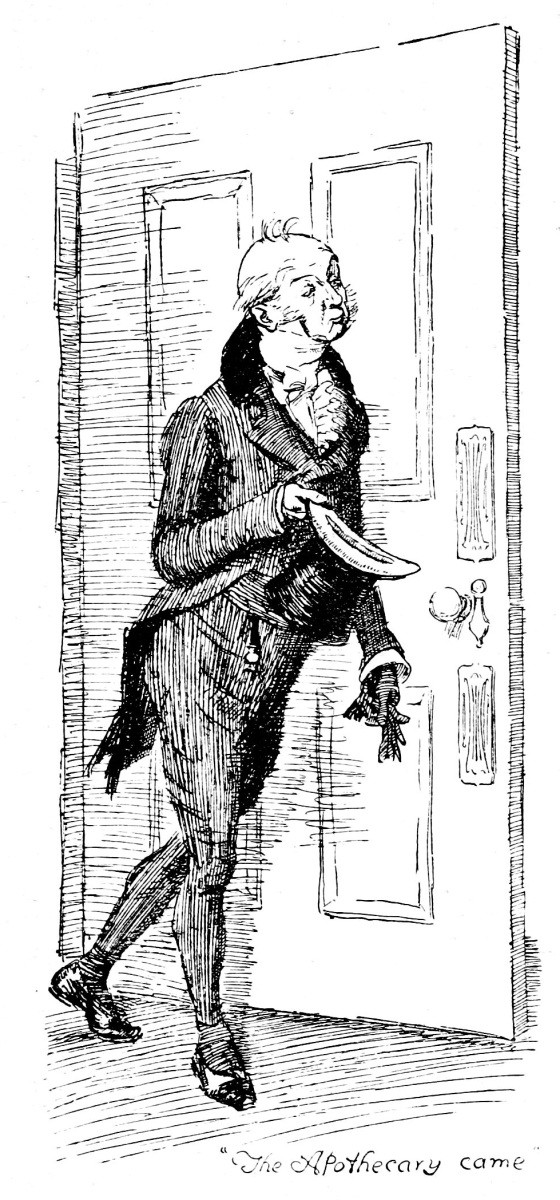
“The Apothecary came”
When breakfast was over, they were joined by the sisters; and Elizabeth began to like them herself, when she saw how much affection and solicitude they showed for Jane. The apothecary came; and having examined his patient, said, as might be supposed, that she had caught a violent cold, and that they must endeavour to get the better of it; advised her to return to bed, and promised her some draughts. The advice was followed readily, for the feverish symptoms increased, and her head ached acutely. Elizabeth did not quit her room for a moment, nor were the other ladies often absent; the gentlemen being out, they had in fact nothing to do elsewhere.
